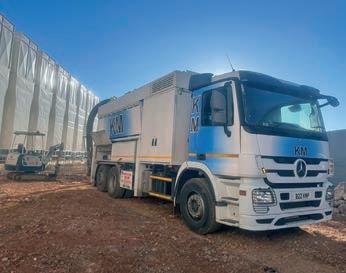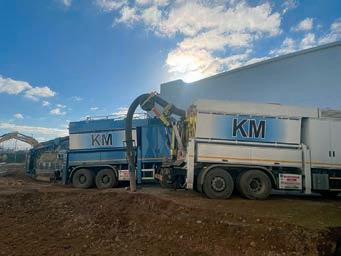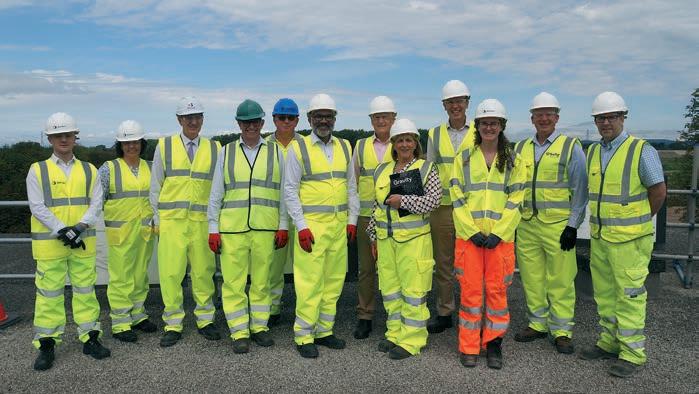






Drones – or unmanned aerial systems (UAS) – are becoming more and more common in the construction and surveying industries. Research has shown that an overwhelming majority of people believe they can have a significant impact in the industry, although fewer than half believe that potential is being reached. Applications range from accessing dangerous places to charting the progress of a site, with high-profile projects involving surveying church steeples and accessing nuclear sites.
Now the ECITB has joined with the industry’s trade body to devise a training course aimed especially at the industry, although some experts advise engaging a specialist consultant to do the actual flying.









[WHILE ON HOLIDAY in the Canaries recently the peace of the surroundings was broken by the passing overhead of a drone. We tend to hear of drone activity in the news these days only in terms of ‘strikes’; but it is not just the military who have embraced the technology of unmanned operations, the construction industry has been expanding its use of drones. Our cover story explains how useful the machines are.
• Carrying out construction work in hazardous environments or hard-to-reach places in a safe manner is one advantage of drone technology, and the field of working safely – whether at height, with machinery or in the day-to-day activities of a site – is the life’s work of a large body of people. Those people come together each spring in Birmingham for the Health and Safety Event. Construction National will be there from 30 April to 2 May as an event partner: it may be where you picked up this copy!
• Constructing safe buildings is the other face of safety culture, and the fall-out from Grenfell is still haunting the industry. The latest chapter in the story of creating the ‘golden thread’ is the implementation of the Building Safety Act and the accreditation of inspectors. It’s proving a lengthy process, and the govt has conceded that fact by extending the timeline for assessment.
• That new buildings are safe should be a given, as is the idea that they should be built efficiently and environmentally responsibly. Modern methods of construction should ensure both. The flagship of MMCs – modular building – has hit rocky waters recently in the unpredictable housing market. There is more stability in other markets, however, including the commercial sector, as a luminary from modular’s trade body explains.
• Education is another sector where modular is well established, and a number of establishments across the country are benefitting from new building programmes to cater for the modern batches of apprenticeship schemes. Our regular training section has news of a number of new facilities being built – from the North East to the South West. They include a new Skills Academy in Redcar.
• Staying in the North East, in Sunderland, an altogether different scale of development has acquired planning consent. One of the largest film and TV production facilities in Europe is to be sited on the bank of the River Wear. Crown Works Studios is the brainchild of a local consortium that includes James Corden.
• Crown Works Studios is a shining example of a brownfield project – breathing new life into a former industrial site. Reusing previously-developed sites is, to the average person, somewhat of a no-brainer. Why use up our natural assets when there are sites sitting there? They can also be used for housing. That, at least, appears to be the view of Housing, Levelling Up and Communities supremo Michael Gove. The sites need remediation, however, and that can be expensive. The RTPI has pointed that out in its response to Mr Gove’s consultation, urging support to carry it out. It also cautions against building housing on brownfield land that is still in active use as part of local economies.
• The alternative to building new housing is, of course, retrofitting the existing stock. The expense of installing energy-efficient upgrades, particularly in heritage buildings, is a persistent headache. Now, some movement has been seen and the RICS has come up with a standard that can ensure consumer confidence.
• All this upgrading requires skilled craftspeople: the aforementioned apprentices. As a Greater Manchester-based publication we can’t let the opportunity pass to point out that three apprentices from our own patch have scooped the pool in The Nation’s A* Apprentice Awards. Congratulation to Alfie, Lily and Dakota! q
Chris Stokes Editor, Construction National


[
PLANS FOR A MAJOR film-making complex in Sunderland have been approved by the city council’s Planning and Highways Committee. Crown Works Studios will be development by FulwellCain Studios, a joint venture between global entertainment company Fulwell 73 and Cain International. It will be one of the largest film-making complexes in Europe, creating some 8,450 jobs across the North East over the next decade.
The plans are being described by city leaders as “the single most significant development announcement to come out of the North East in decades” and will build on Fulwell 73’s existing presence in the city. The development of the 1.68 million sq ft hub at the city’s Pallion district will have 20 premium sound stages suitable for major feature film and HETV productions. The scheme – which has attracted funding as part of a ‘deeper devolution’ deal – will be delivered in three phases, the final phase set to complete by 2027.
Leo Pearlman, managing partner of Fulwell 73 – which also includes TV star James Corden among its partners – said: “Today is a historic moment for Sunderland, the North East and the UK’s screen industries. Crown Works Studios will help transform the city we love into a global hub for big budget film and TV production. Britain’s creative sector is at its best when industry and the public sector share the same vision and work together to deliver it – so I’m hugely grateful for the backing of the new North East Mayoral Combined Authority and for the partnership between them, Fulwell 73 and Sunderland City Council. Our screen industries are world-leading – and with this backing, the UK, with the North East in its arsenal, can grow its capacity for the production of film and high-end TV.”
Sunderland City Council leader Graeme Miller added: “This is a monumental day for Crown Works Studios, Fulwell 73, Sunderland and the North East, unlocking jobs and opportunities for our people and businesses that will bring about benefits for generations to come. We have worked hand-in-glove with Fulwell 73, the government and our regional partners to ensure that this scheme – which is game-changing for the whole of the North East – will move from vision to reality.”
The studios will be transformational for the city’s economy, cultivating an eco-system on a scale not seen since Nissan’s investment in Sunderland in the 1980s, while meeting the growing demand for studio space in the UK. Upon completion, the scheme could generate £334m for the local economy every year, creating jobs and contract opportunities spanning a vast range of disciplines including the trades and manual skills.
Leo Pearlman continued: “Fulwell is a company built on family and the North East is embedded in our DNA. For over 100 years my family had a business here in Sunderland and called this great city home, so to be able to bring Fulwell back to where the inspiration for our global entertainment company began is a truly humbling experience.
“Through delivering the studios, we will create a long-term production industry infrastructure, attract even more significant highend production to the UK and ensure that future generations of North Eastern talent can develop and prosper at home within the region.”
Crown Works Studios will include provision for production workshops and office space, a vendor village for supply chain businesses, administrative and social facilities, a multi-storey car park and an extensive backlot.

The scheme is in addition to already announced plans for Shipyard Studios which will support a wider cluster of film and media activity.
Cllr Graeme Miller had earlier said of the plans: “This is a vote of confidence for the city and its people – recognising Sunderland’s history of innovation and of making things. We have been working on these plans with Fulwell 73 and Cain for many months, so it’s absolutely brilliant to finally be in position to unveil them, and to demonstrate the scale of ambition we have for this city. It’s absolutely transformational and something we’re determined to see through.” q
[
THE Royal Town Planning Institute (RTPI) has expressed its support for the government to build more homes on brownfield land. However, the institute has warned that new urban brownfield schemes must be closely monitored to ensure residents are not landed with poor-quality homes or poorly-planned developments that people wouldn't want to live in.
In its consultation response, the RTPI has emphasised the importance of ensuring that new market housing does not displace commercial, industrial and logistics uses for brownfield sites that are critical for local economic growth.
The institute further stressed that brownfield and previously developed land can be more difficult to develop, and the government should take more proactive steps to help councils encourage such development.
To facilitate the process, the RTPI has suggested that scaled-up Homes England funding for brownfield development, and support for
local authorities to review and update their brownfield land registers, could be instrumental in strengthening development pipelines quickly.
The institute also recommends that stronger mechanisms for strategic planning and public service provision could help make previously developed land better serve their communities in the long term.
Victoria Hills, chief executive of the RTPI, explained: “We welcome the government’s drive to deliver more homes on brownfield land. However, it is crucial that new developments are well-planned and of high quality, and that they do not displace important commercial and industrial uses that play an important role in supporting sustainable mixed-use places, including local economies.
“With the right support and funding, we can ensure that brownfield sites are brought back into use in a way that benefits local communities and contributes to economic growth.” q

[CALDERDALE AND HUDDERSFIELD NHS Foundation Trust has announced Laing O’Rourke as the preferred partner to progress the design stage of the new four-storey clinical building at Calderdale Royal Hospital.
The project will deliver a new adult and children’s accident and emergency department with resuscitation bays and assessment rooms, as well as 10 new in-patient wards.
Laing O’Rourke has constructed state-of-the-art infrastructure and buildings projects for a number of NHS trusts. The company was chosen for its expertise in delivering high-quality, sustainable modern hospitals, and for its commitment to embedding social value throughout the programme.
BrendanBrown, chief executive of Calderdale
and Huddersfield NHS Foundation Trust, said:
“This announcement marks the start of an important milestone for the trust; and working with Laing O’Rourke, we can now further progress the design of our new clinical building to enable us to deliver high-quality, innovative care to patients.
“We will be working closely with our patients and colleagues to co-design the new facilities in a way that best meets their needs.”
Laing O’Rourke’s group chief operating officer Cathal O’Rourke added: “We’re excited to begin this journey with Calderdale and Huddersfield NHS Foundation Trust to provide a state-of-the-art emergency department that will serve the local community for decades to come.
“We’ll use our blueprint for hospitals, which
involves working with the trust, its patient groups and the wider project team to influence design and to deliver a programme of work that embeds modern, sustainable methods of construction that will ensure the highest quality, safer working environments and programme accuracy.
“This project will also enhance the local area as we’ll be able to engage with schools and business to provide working opportunities and education.
“We have vast experience working with the NHS, having built 18 hospitals in the last decade, and can use our industry-leading experience for Calderdale Royal Hospital.”
The enabling works are due to start at the end of this year, with the project due for completion by the end of 2029. q

[DIRECTOR OF BUILDING SAFETY for HSE, Philip White, has written to the building control industry outlining new transitional arrangements for the registration of building control inspectors in England.
The Building Safety Regulator (BSR), part of HSE, has listened to the concerns raised by the profession, including the potential impact on the construction industry if there are not enough inspectors registered to practise by the legal deadline.
It is crucial those concerns are balanced with the requirement for BSR to implement the Building Safety Act 2022 and the need to raise standards in the profession. It is also important to remember that the changes were introduced in the wake of the Grenfell Tower tragedy.
A competence assessment extension period of 13 weeks has been introduced from 6 April to 6 July 2024 to enable those who meet specific criteria to continue to operate. That is not an opportunity to delay completing registration as a Registered Building Inspector (RBI) and there will be no extension to these arrangements.
According to a release from HSE: “BSR has seen a positive response to the changes among the profession and it is encouraging to see a large number of people already engaging with the process. As of today (14 March) 3,261 professionals have started their applications to register.
“In line with BSR’s enforcement policy statement and the principles of proportionate regulation, BSR will target its regulatory activity at those who present the greatest risk, particularly those who are not engaging with the new regulatory regime.”
Philip White’s letter reads:
Dear Colleagues,
As you will be aware, a number of concerns have been expressed by the building control profession about whether enough building control professionals will be registered as RBIs by 6 April.
I understand those concerns and have been working with colleagues in BSR and across government to consider what we can do to support the profession. To that end, the decision has been taken to implement a competence assessment extension period for those meeting set criteria.
Professionals who are not registered by 6 April will not benefit
from the extension period and will not be able to continue to work on regulated building control activities.
Experienced building control professionals who are not trainees but have not yet completed a competence assessment will have the scope of their registration temporarily extended provided they meet the following criteria:
Temporary Class 1 Registration Extension Criteria:
• They are an existing building control professional;
• They are registered as a Class 1 RBI by 6 April 2024;
• They are enrolled in, and in the process of having their competency
• assessed through, one of the BSR approved competency assessment
• schemes by 6 April 2024. These are: cbuilde.com, www.thebscf.org
• and www.ttd-education.org
• A scheme provider has not told them that they have not passed their
• competency assessment for a second time
Those who meet the above criteria will be allowed a period of 13 weeks from 6 April 2024 to 6 July 2024 to complete their competency assessment and upgrade their registration to Class 2 or 3 (and 4, if applicable).
During this period, the scope of their registration will be temporarily extended, and they can continue to undertake building control work for the class of RBI for which they are undertaking a competency assessment.
Those who meet the criteria but do not successfully complete a competency assessment and upgrade their registration class by 6 July will not be able to continue to undertake regulated building control activities.
More detail on the transitional arrangements can be found here:
www.hse.gov.uk/building-safety/building-control/codes-standards.htm
This must not be seen as an opportunity to delay – there will be no extension to these arrangements. From 6 July 2024 any professionals who have not completed a competency assessment and upgraded their registration class will only be able to undertake work under supervision.
We expect employers to support staff going through the assessment process by ensuring they have time to complete the assessment process and providing assistance and support to help them to succeed.
I encourage everyone who has not yet done so to register with BSR and enrol with one of the competency assessment schemes as soon as possible.
Philip White, Director of Building Safety, HSE. q
[THE Royal Institution of Chartered Surveyors (RICS) has launched a new Residential Retrofit Standard, following an extensive eight-week-long consultation period.
The new standard has been developed by a team of experts as a response to a demand for high-quality, residential retrofit advice, spurred on by increasingly high energy prices and UK government net-zero targets, and will provide a framework within which RICS members can advise their customers on retrofit options in homes across the UK, in turn supporting the nationwide effort to decarbonise the residential property sector.
The standard also ensures that consumers receive advice from skilled, regulated professionals and ultimately protects the public interest by upholding high standards in a growing market. It is intended to be applied and understood across the UK residential sector and is the only one of its kind designed to support surveyors and provide assurance to both consumers and lenders.
A series of extra questions were included in the RICS Residential Property Monitor in January, to gauge the impact of energy-efficient properties on market trends, which made for some interesting and insightful responses.
When survey respondents were asked if they had seen greater interest from buyers in homes that are more energy efficient, 39% said they had noticed an increase in demand, which is an increase on the 34% when the question was asked in June 2023.
On the same basis, 43% stated that sellers were looking to attach a premium to homes that are more energy efficient (42% last time).
While 26% reported seeing buyers highlight poor energy efficiency as a reason for making an offer below asking price (23% previously), 37% said that higher energy efficient homes were holding their value in the current market.
Paul Bagust, RICS head of property practice, commented: “As homeowners increasingly look to explore ways to retrofit their homes to improve energy performance, it is critical that advice is given by a highlyqualified professional.
“It is clear, especially from the results of the extra questions added to our monthly residential survey, that there is a market need for a standard that facilitates quality, reliability and consistency, and the RICS Retrofit Standard does just that.
“This fully comprehensive standard will be rigorously upheld by RICS and has been designed to be used and understood by a broad range of professionals in the industry. We are asking for the recommendations in the standard to be implemented by 31 October 2024.”
The launch of the standard contributes to RICS’s goal to continue to lead and influence on sustainability. RICS is also advocating for policy reform to accelerate decarbonisation of the built environment and is spearheading a whole life approach to measuring and monitoring carbon emissions in the sector. q
[THE CONCRETE INDUSTRY came together at the NEC from 20-21 March at the UK Concrete Show 2024: the annual meeting place for the trade and an opportunity to make invaluable new contacts and reacquaint with existing customers.
By the time the doors closed on Thursday afternoon 4,759 industry professionals had registered for the event, representing 33% visitor growth compared to 2023.
There was standing room only during the two morning sessions at the seminar theatre and the organisers are planning a larger theatre set up next time. The Innovation Hub was also well received.
Visitors could vote for their favourite product, with the winner of the inaugural Innovation Award being announced on 17 April.
With over 20% growth in exhibitor numbers show-onshow, there’s even more choice every year, from established market leading brands and new entrants to the market. From volumetric trucks, batching plants and pumps to formwork, admixtures and low-carbon concrete, the exhibition is guaranteed to provide something new that businesses can profit from for years to come.
The UK Concrete Show is committed to providing a seminar experience to enrich and engage the visitor. The Concrete Connect Seminar Theatre, situated on the exhibition floor, featured over 20 free-to-attend seminars, including sessions on: Meeting the challenge of net zero; Prevention or cure; Celebrating innovation; and Keeping the concrete industry safe.
Hosted by Susannah Streeter, a professional broadcaster and conference moderator, each session concluded with a panel and live Q&A with the audience.
The Innovation Hub is a curated gallery showcasing the latest technology being promoted by exhibitors at the show. q


A focus on safety can expand work opportunities and open up a contractor to new and innovative business areas. KM Group, a prominent civil engineering contractor based across Wales and the South West of England, has carved a niche for itself in the industry through its specialisation in multi-utility mains installation, repair and maintenance. Renowned for its commitment to safe working practices and ethical operations, KM Group partly puts its success down to its longstanding partnership with the supply chain risk management experts, Veriforce CHAS.
Here, Murray Ambler-Shattock, group strategic operations manager at KM Group, explains how working with Veriforce CHAS has helped KM Group enhance its industry presence. He also discusses their shared objective to enhance safety and efficiency in the civil engineering sector, including through investment in the very latest technology.
[
FOR SEVERAL YEARS, KM Group has been a proud partner of Veriforce CHAS, which has helped us to showcase our commitment to being a responsible and reliable contractor and enabled us to work with major contractors in our sector.
Being accredited to CHAS Elite – which includes the Common Assessment Standard –shows we adhere to high standards across a wide range of risk areas, from health and safety to environmental management, to equality, diversity and inclusion. It also gives us a tool to set standards for our supply chain, so the contractors we work with are typically accredited to CHAS Standard or CHAS Advanced.
Like Veriforce CHAS, at KM Group we are strong advocates of the Common Assessment Standard and its potential to improve efficiency and risk management standards in the construction sector. Veriforce CHAS was the first accreditation body to offer the assessment, and we were one of the first companies to complete it.
Accreditation isn’t complicated: it’s the golden ticket
Achieving accreditation is not a daunting task but a demonstration of our efficient business systems. In our experience, many organisations unknowingly already possess those systems in some form, and accreditation merely involves certifying their functionality.
Veriforce CHAS has been instrumental in conveying that message to our supply chain and supporting our contractors on their accreditation journey. That support is particularly beneficial for our smaller contractors, as CHAS Standard provides an entry-level accreditation that forms a solid foundation for future growth.
We view accreditation as the golden ticket, enabling business expansion and fostering collaboration with reputable employers. It establishes credibility and opens doors to valuable opportunities.
Veriforce CHAS collaborates with clients like us to enhance overall compliance within

supply chains. As contractors within our supply chains embark on their accreditation journey, they often aspire to achieve higher levels of accreditation, making them more appealing partners. This increased accreditation assures supply chain partners that those contractors are responsible businesses with effective risk management systems. That helps to raise standards overall and positively impacts the entire sector, creating a more conducive working environment for everyone involved. Furthermore, there is a substantial effort through the Common Assessment Standard to enhance efficiency. That initiative aims to streamline the accreditation process, eliminating the need for contractors to undergo multiple assessments. Once contractors have completed the Common Assessment Standard through CHAS Elite, their certification becomes accessible through

any of the accreditation providers, opening up even more opportunities for them.
In recent years KM Group has embarked on a journey of innovation by investing in vacuum excavation, a revolutionary technique transforming the construction, utility infrastructure and civil engineering sectors. This non-destructive digging method uses compressed air and a high-powered vacuum to excavate soil and materials gently. That is safer for operators and avoids the classic challenge of damaging pipes and cables, which can be extremely dangerous, as well as both costly and disruptive to a project. KM Group's adoption of vacuum extraction aligns with the industry trend of adhering to PAS 128 standards, significantly improving utility detection accuracy in the UK.
KM Plant Hire & Groundworks Ltd, a subsidiary of KM Group, stands out as a leader in innovation in the utilities sector. Successfully implementing vacuum extraction in various locations, we have been championing safety, efficiency and reliability in utility detection processes. That forwardthinking approach provides exceptional value to clients and positions KM Group as a pioneer in adopting innovative practices for safer and more efficient operations.
The journey of KM Group serves as a compelling case study in how strategic partnerships, such as our relationship with Veriforce CHAS, can propel a company to new heights. Through accreditation, KM Group has not only gained access to major industry projects, but also uncovered hidden efficiencies within our operations. The adoption of vacuum excavation further solidifies our commitment to innovation and safety, and we believe it establishes us as a trailblazer in the everevolving landscape of utility infrastructure. q
• For further information visit www.chas.co.uk or call 0345 521 9111.

[IN FEBRUARY the government announced measures to allow 20,000 new affordable homes to be built across the country, thanks to a £3bn increase in the government-backed Affordable Homes Guarantee Scheme, which provides low-cost loans to housing providers.
For the first time the scheme can also be used to upgrade existing properties, making them warm and decent for tenants. Providers will be able to apply for loans to carry out vital building safety works, such as the removal of dangerous cladding.
Backed by the Department for Levelling Up, Housing and Communities, the now £6bn fund will help housing providers access low-cost loans so they can expand their business, build more affordable homes and upgrade their existing stock.
As part of the scheme, providers will be able to apply for loans to help make homes fit for the future. Those energy upgrades, such as solar panels, could potentially save tenants hundreds of pounds on their energy.
Housing Minister Lee Rowley explained: “We know getting costeffective loans can be a stumbling block for many developers building more affordable homes or upgrading their existing stock, so it is of the quality tenants deserve. This new round opening today will not only improve the lives of those already living in homes, but help thousands of families benefit from new, high-quality, affordable housing.”
Launched in 2020, the scheme, delivered by ARA Venn, is already helping 12 providers to deliver 6,290 new homes, with thousands more to be built in the coming years. ARA Venn is part of ESR Group.
Among the beneficiaries of the scheme is Watford Community
Housing. They first accessed the scheme back in November 2021 and it helped them build 200 new homes, including the firm’s first modular development. As part of a second funding application made in December, they are set to build a further 100 affordable homes.
Deputy chief executive Paul Richmond said: “We were delighted to work with ARA Venn for a second time under the current Affordable Homes Guarantee Scheme. The funding represents excellent value for the sector and offers best value for fixed rate debt for our organisation.
“The benefit of using the Affordable Homes Guarantee Scheme in terms of pricing over our 30-year plan is worth nearly 100 additional homes being delivered into our local community. This has significant commercial benefit to us but more importantly has a direct impact on the wider need to build more housing across the country.”
Richard Green, portfolio manager for AHGS20 and partner at ARA Venn, added: “We are delighted that we will be able to provide low-cost loans to private registered providers across England to now facilitate investment in existing homes, in addition to new ones. We look forward to continuing and building on the success of the Affordable Homes Guarantee Scheme that has already proved a key source of funding for the sector.
“This timely expansion of the scheme allows us to support the sector’s balancing of investment priorities between providing new homes and ensuring the quality and energy efficiency of existing homes.”
Eligible registered providers who would like further information about the scheme, the scheme rules and how to apply should contact ARA Venn at ahgs@ara-venn.com. q
[COMMUNITIES ACROSS SCOTLAND have been recognised at the Scottish Government’s relaunched Scottish Planning Innovation Awards (SPIA). The award ceremony took place on 21 March at the site of previous winner, Carron Dams local nature reserve in Falkirk.
The overall winner was Planning Aid Scotland’s Live Life Morvern initiative, a community plan of action which pulls together local resources and ideas to build a sustainable future for the area.
Aberdeen City Council Beachfront Masterplan, which involved local children at the design stage (pictured), won the People’s Choice Award – voted for by the public.
Other winners of the awards include a community-led transformation project in Dundee, partnerships revitalising a heritage site in West Dunbartonshire, Fife Council’s approach to the future of the planning workforce and Nature Scot’s use of AI to help map the effects of climate change.
A new Digital Skills Portal was also announced at the award ceremony, hosted by Planning Minister Joe FitzPatrick. The portal is a partnership between the Scottish Government and the Royal Town Planning Institute, which will help planners improve their digital skills.

ambitious programme of improvement work.
“I am delighted at the variety of projects from across Scotland. The commitment to sustainable planning not only enriches environments but also the lives of people who use and live in these places.” q




[OVER THE PAST YEARS the use of unmanned aerial systems (UAS), or drones, in the construction and surveying industries has grown exponentially, having survived the public furore over irresponsible flying by members of the public and even the closing of Heathrow Airport. Now, following regulation of the industry, where and when to fly drones and who can fly them has been to a great extent established.
Last year PwC published its latest market research on commercial drones, which found that more than 80% of people said drones can have a significant impact within industry, mainly in terms of cost and time savings, carbon reductions, productivity and safety.
However, the Bringing Trust in Commercial Drones report – an assessment of how industry attitudes to drones have changed – revealed only 43% of people feel drones are being used effectively by industry.
Nevertheless, in the construction and surveying industries the technology has been embraced. Some of the more spectacular uses have been in the heritage and ecclesiastical sectors, with the hazardous tasks of inspections of church towers, castles ramparts and old bridges attracting public attention.
The general surveying industry has also adopted the technology. Aerial surveying of hard or hazardous-to-access sites has become safer and more efficient. A notable example is Sellafield, which has a programme of training of drone operators underway.
As drone specialists OSCAM point out: “By reducing the need for humans to physically access hazardous or hard-to-reach areas, we can conduct inspections of tall structures, roofs and remote locations, minimising the risk of accidents, injuries or fatalities associated with more traditional inspections. And you won’t need to spend hard-won resources on scaffolding or access equipment.”
Even during the construction phase, drones can provide real-time assessment of progress. As 123 Drone points out: “Monitoring a construction site using drones and 360º cameras provides valuable data and visual documentation that contribute to the success of construction projects. This documentation serves as a valuable record for future reference, reporting and as-built documentation.”
The 2023 PwC report found 56% of respondents saying drone use could be increased by introducing industry-specific qualifications.
A few months later, following the success of a pilot programme, the Engineering Construction Industry Training Board (ECITB) launched the quality-assured Foundation UAS Training Course.
Created in collaboration with ARPAS-UK – the UK Drone Association – alongside a working group made up of industry and drone experts, it develops the knowledge and skills needed to operate drones specifically in industrial environments.

However, there are pitfalls for the unwary, particularly in interpreting the plethora of super-accurate data a drone flight can provide.
Operator AirVantage Drones explained: “Drone technology has undoubtedly revolutionised surveying, offering unparalleled advantages in data accuracy, time efficiency and access to challenging terrains. However, operating a drone extends beyond just flying and capturing images; it involves a deep understanding of aerial safety and risk, equipment management, compliance with Civil Aviation Authority (CAA) regulations, and sophisticated (and sometimes suffocating) data management. These facets form the backbone of professional drone operations, requiring specific training, experience and continuous skill development.”
Using drones has many advantages, particularly in engineering construction sectors. Exposure to workat-height risks and other hazardous environments can be significantly reduced through drone use for asset inspections. However, as the PwC report outlines, 59% of those asked believe drone use could be increased by ‘improving clarity’ on their benefits to industry.
The week-long ECITB course delivers this awareness through its different classroom and practical modules. As well as carrying out a practical flight competence test, where operatives pilot a drone in a real environment and capture, store and share viable images, the theory side covers all considerations for operating a drone on an industrial site.
These considerations include how to comply with site policies, the weather, type of drone, environment, data protection, emergency and reporting procedures, risk assessments, pre-flight planning and checks, and human factors.
ARPAS-UK has hosted a webinar, Improving & Certifying Remote Pilot Skills for Drone Operations in the Engineering Construction Industry . The presentation introduces the certifications and explains why they were developed and who for, as well as the structure of the courses and how they can be accessed. The presenters are Elliott Corke from Global Drone Training and Reg Rudd from the Engineering Construction Industry Training Board. q
Welcome to our A to Z guide of the websites of some of the industry’s leading players.
If you are one of our many online readers simply click on any of the logos listed below and you will be automatically directed to that company’s website.
To get your company’s website listed on this page just give us a call on 0161 710 3880 or email ian@dmmonline.co.uk



02394 212653 www.checkatrade.com





Huck Tek has the experience and expertise to design and install netting solutions to meet your specific requirements. www.hucktek.co.uk

Manned Construction Site Security Service. We can provide an integrated, fully insured security solution for your construction, redevelopment or demolition site. www.knight-owl-security.co.uk

Cream Rises to the Top www.nasc.org.uk

Working within the Construction Industry • Health & Safety Training • Roofing Training www.nimrod-training.co.uk



The
[
THE Infrastructure and Projects Authority (IPA) has published a new framework which sets out how AI will be harnessed to boost productivity in public project delivery.
The framework enables civil servants working on over £805bn of public projects to utilise AI to improve the effectiveness and efficiency of their delivery.
The guidance encourages responsible experimentation with AI to find solutions to the biggest challenges in public projects.
The IPA will work with cross-government AI leaders to oversee a series of innovative pilots. The most successful experiments will have the potential to be rolled out to optimise performance.
Under the new framework, the upskilling of project delivery professionals in data analytics and AI will also be accelerated to help tackle issues like overspend and delays.
The publication of the framework follows Deputy Prime Minister Oliver Dowden’s speech on AI for Public Good, which set out the government’s commitment to using AI to revolutionise public services, boost productivity and save taxpayers money.
The report also recommends that barriers to sharing data are removed where appropriate, by developing common standards, infrastructure and processes, so that the potential of new technology can be realised.
Cabinet Office Minister of State, Baroness Neville-Rolfe, said: “The innovation we are seeing in data analytics and AI has the potential to significantly benefit government project delivery and, even more important, to save the taxpayer money. As a former business executive I am delighted that our new framework sets out our determination to explore the possibilities further through collaboration, upskilling and experimentation.
“The importance of greater collaboration between government and its partners, to create the right conditions for innovation to thrive is also highlighted in the new framework.”
Karina Singh, director of function, insights and profession at the IPA, said: “The use of advancing technologies, especially AI, is a topic of broad and current interest. This paper cuts through the noise to provide a framework of actions we can use to experiment with and upskill project delivery professionals to get the most out of this fastmoving development.” q
[
ON 4 DECEMBER NBS, the platform for connected construction information, revealed the results of its Digital Construction Report. The study explores the industry’s evolving relationship between digital technology and safety and sustainability – the sector’s biggest challenges. This year it showed twothirds of professionals using digital tools to calculate environmental-related metrics: a sign that sustainable design is now intrinsic to construction processes.
Significantly, four in 10 use digital methods to understand the embodied carbon attached to a project – that is, the amount of CO2 emitted during construction. A similar figure (38%) also use it to quantify the energy demands of structures and the components that go into them. There’s room for improvement, the report says, but the figures show a clear push towards lower carbon outcomes.
Continuing with the theme of sustainable construction, NBS also analysed levels of off-site construction, an area often associated with greener building practices due to greater control of materials and waste. The results found that MMCs (modern methods of construction) continue to gather pace.

Over half of professionals (57%) had been part of a construction project that had used or required off-site construction within the last year. This is an increase of 7% since 2021. The news comes despite the closure of several high-profile MMC factories.
The report also found that cloud computing is becoming further embedded within building practices, with four out of five now using it.
The stats highlight the positive way technology is supporting collaborative working, with over three-quarters (77%) using it to share documents and information with clients. A similar number (74%) use it to collaborate with team members and produce 3D models, specifications and other important documents.
NBS’s Digital Construction Report also highlighted increases in the number of professionals following naming conventions when sharing information (77%) – an area that can improve the organisation and management of data. Additionally, over half of respondents reported using interoperable formats like IFC, revealing the growing importance of easily shareable construction data.
However, the report also showed that there are more opportunities to be unlocked by using digital technologies to help with compliance.
Commenting on the survey’s results, David Bain, NBS’s research manager, said: “The uptick in professionals seeking environmental-related metrics shows an industry putting sustainability front and centre. The drive towards net-zero has no doubt been a catalyst alongside the evolving legislative landscape – there’s never been a greater emphasis on the environmental impact of building practices.
“The study has also yielded unexpectedly positive stats around off-site construction. Despite media headlines and high-profile factory closures giving the impression that MMC isn’t a popular choice, the results show a different story: more professionals are embracing off-site elements than ever before.
“Overall, we’ve seen some marked improvements that the industry should be proud of. There’s an opportunity here to improve digital information sharing, for which professionals have a legal requirement. The ‘golden thread’ and the use of structured data is creating a safer future for all.”
The full report can be downloaded from the website at www.thenbs.com/digital-construction-report-2023/ q


[THE NO FALLS FOUNDATION, the first and only UK-based charity for the work-at-height sector, has launched its first-ever No Falls Week: a campaign dedicated to promoting safe working at height.
Taking place from 13-17 May, No Falls Week’s mission is simple yet crucial: to raise awareness about the importance of safe working at height, prevent falls and ensure everyone that works at height comes down safely.
It is estimated that over 1 million businesses – and 10 million workers – carry out work involving some form of working at height every year. No Falls Week will provide the opportunity for organisations across all sectors to place a focus on work at height safety.
Falls from height are consistently the leading cause of workplace fatalities in the UK, with 40 people losing their lives at work due to a fall from height in 2022/23. According to figures from HSE, that represents a third of all workplace deaths – up from a quarter the year before.
As awful as the fatality statistics are, there are an even greater number of non-fatal injuries resulting from a fall from height, with over 5,000 people in Great Britain having been reported injured at work in 2022/23. However, the No Falls Foundation knows there is substantial underreporting of non-fatal falls from height by all workers, particularly the self-employed who were found to report just 12% of workplace incidents. According to the Labour Force Survey, the HSE estimates the number of workplace falls from height over the past 10 years may be up to 425,000.
Along with all the lives, families and businesses affected by these accidents, up to 992,000 working days were lost through non-fatal falls from height in Great Britain in 2022/23 alone. Not only that: the total cost of falls from height last year was estimated to be over £847m, made
[
THE POPULAR, user-friendly Construction Industry Scaffolders Record Scheme (CISRS) CAP 609 General Information Booklet has been revised. It includes updated information about the new entrant card route and provides a very useful overview of the CISRS scheme.
It’s a great reference document for those looking to complete CISRS training, scaffolders, employers and the wider industry. The A5 booklet is designed to provide a detailed overview of the CISRS scheme and includes the full range and scope of courses, including CISRS COTS, Part 1, Part 2, Advanced, CPD, Supervisor & Manager, Inspection and Scaffolding Awareness training. The new printed copy of the CAP 609 booklet will be available in the coming weeks and, along with the Have You Got The Right Card? poster, are free of charge. Contact enquiries@cisrs.org.uk to pre-order. A PDF version of the booklet is available to download now on the websote at cisrs.org.uk/cap609-info q

up of costs to the employer and the individual, government tax losses and benefit payments.
Hannah Williams, charity manager at the No Falls Foundation, explained: “Everyone who needs to work at height should be able to work safely and return home unharmed at the end of every shift. Unlike most other types of workplace injuries, the consequences of a fall from height are usually life-changing for the person involved, with many unlikely to return to their previous occupation, as well as having long-term consequences for employers, colleagues and families.
“Whether you work in construction, manufacturing, agriculture or any other sector, No Falls Week is an opportunity for everyone to shine a spotlight onto the mental, physical and societal consequences of working at height accidents.”
Employers can sign up to get involved via the No Falls Week website, where there are a host of toolkits and resources from members of the Access Industry Forum to help organisations plan activities during No Falls Week. That may include hosting toolbox talks, workshops or safety demonstrations, distributing informational materials and engaging in social media campaigns.
Expressing its support for the initiative, the NASC commented: “Each year, hundreds of thousands of individuals engage in work at elevated levels across various industry domains. This type of work spans sectors such as construction, roofing, facilities management, and extends to numerous others where individuals, often unknowingly, operate at heights within settings like shops, offices, factories and hospitals.
“Regardless of the industry, they all face a common threat: the risk of falls that could result in fatal consequences or life-altering injuries, profoundly affecting not only the individuals involved but also their families, friends, and colleagues.
“The mission of the No Falls Foundation is to prevent falls from height and support individuals impacted by the significant life-altering effects of such accidents. NASC proudly supports this initiative.” q
• For further information and to sign up for No Falls Week, visit nofallsweek.org/get-involved/
[THE National Access and Scaffolding Confederation (NASC) has issued a technical update to its TG20:21 guidance, bringing it in line with current practices with baseplates. The update confirms the position on baseplate thickness for scaffolding and access systems across the UK.
The document has been made available immediately on the NASC members-only website and will shortly be available on the NASC ePortal. It confirms the correct use of 2mm, 3mm and 5mm baseplates in various situations. That is following professional testing by an accredited test centre. q
specialist Paramount Platforms has become the first access hire company in the UK to take delivery of the new Hinowa 40.18 Lightlift Performance IIIS.
Access Platforms Sales (APS) has supplied the company with the tracked spider boom –now the largest in the Hinowa range, with a maximum working height of 40.2m.
Paramount Platforms sent the spider platform straight out on long-term hire to support planned maintenance work on a prestigious financial HQ building in central London.
The Hinowa Lightlift 40.18 has a maximum outreach of 17.5m. It has a larger basket than other Hinowa spider lifts, with a maximum capacity of 300kg and an unrestricted capacity of 230kg.
Paramount Platforms director Lee Kerr is full of praise for the platform’s performance and potential. He said: “This Hinowa is the best spider lift in its performance range.
“It’s a gamechanger in terms of the ability of our clients to work independently at heights approaching 40 metres and where significant outreach is needed.
“We almost always supply our other large spider lifts with an operator. The Hinowa 40.18 is so easy to use, if the client has experience using other Hinowa platforms, I have no qualms about the 40.18 going out on self-drive hire.
“Its ease-of-use is not just a nice to have,” he added. “It opens up the possibility of hiring large platforms to a whole new segment of


customers, by influencing judgements about rental risks.”
Lee Kerr continued: “It’s just as simple to operate as a Hinowa 17.75, so with a standard familiarisation training, it can be operated by a cleaning technician or a surveyor carrying out a building inspection.
“Members of the facilities management team who were the first to take our Hinowa 40.18 on hire were amazed at its performance, including how quiet it is. It’s achieving everything we expected, and more.”
Paramount Platforms has taken a bi-energy Hinowa 40.18, with a low-emissions diesel engine and lithium batteries, for all-electric zero-emissions and low carbon operation.
That provides the rental company with maximum flexibility for outdoor and indoor operation, also for working in ultra low emissions zones and where noise-level restrictions apply.
The Hinowa Lightlift 40.18 can also be supplied with diesel engine only or solely with lithium battery electric power.
Founded in 2009, Paramount Platforms has one of the biggest spider fleets in the UK, with working heights ranging from 15.7m to 42m, the biggest proportion of them Hinowa platforms.
Linda Betts, key accounts director at APS, Hinowa's UK and Ireland authorised distributor, said: “It’s very positive that Lee and Paramount Platforms customers are so happy with their new Hinowa 40.18.
“Hinowa puts a huge amount of investment in making all their platforms extremely easy and intuitive to operate, with smart functions that ensure they’re very safe and reliable.
“The 40.18 has the same operating system as other Performance IIIS platforms, which is why operatives can confidently switch between different machines.
“However, we think it will be the platform’s impressive outreach that rental companies will find gets them plenty of hire requests.
“The Hinowa 40.18’s up and over capability will solve just as many lower working height challenges, between 15 and 30 metres say, where outreach is vital and will allow tasks to be completed with less disruption and cost.”
The Hinowa Lightlift 40.18’s basket is 2,000mm long and 700mm wide, allowing three operatives to work at height at its full capacity of 300kg. In this set-up, maximum working height is still 40.2m, with outreach limited to 16.5m – still an impressive figure.
The platform can also be set up in a narrow stabilisation area for working in particularly confined spaces – another function created by Hinowa to enhance the flexible use of its largest spider platform.
In this set-up, the stabilisation area is 6,675mm by 3,640mm compared with a standard stabilisation area of 5,375mm by 5,040mm.
That gives the platform a maximum working height of 35m and an outreach of just under 11m, with a maximum basket capacity of 230kg.
When stowed for tracking, the Lightlift 40.18 is still very compact, with a width of 1,200mm and a height of 1,199mm. That is just 230mm wider than a 20m Hinowa Lightlift 20.10 and the same stowed height. q
• For further information visit the website at www.accessplatforms.co.uk.
[THE International Powered Access Federation (IPAF) has announced the launch of its Global Safety Campaign for 2024: CRUSHING CAN KILL! It is the third such campaign during the tenure of IPAF’s head of safety and technical Brian Parker, and aims to raise awareness and reduce entrapment and crushing incidents involving mobile elevating work platforms (MEWPs), which have resulted in numerous fatalities and injuries over the past decade.

Led by Brian Parker and Alana Paterson, head of health, safety and environment at Taylor Woodrow and chair of the IPAF International Safety Committee, the campaign emphasises the importance of training, proper planning and adherence to safety protocols when operating MEWPs and using pedestrian control mode.
[THIS YEAR PASMA – the Prefabricated Access Suppliers’ and Manufacturers’ Association – turns 50; and five decades of access tower safety is certainly worth celebrating.
That’s why PASMA is hosting a 50th Anniversary Celebration Conference & Gala Dinner on 12 September at the Royal Lancaster Hotel, London.

Throughout the year the association will be looking back to 1974, when it was run by volunteer industry members. Health and safety legislation had just been enacted (including the creation of the HSE) following EU accession the previous year.
PASMA’s website offers a fascinating potted history of the aluminium scaffolding tower: “Originally designed just after the Second World War in the US, alloy towers were imported into the UK until the 1950s, when production started under licence in the UK. During the 1960s and 70s, a number of companies entered the manufacturing market and, thanks to financial and legislative pressures, the hiring of towers expanded rapidly to create an annual sales market worth over £12m in 1985.”
That “explosive growth” in the market prompted PASMA to switch emphasis from acting as a conventional trade body to focusing on the provision of user training.
“On the back of its training course PASMA has developed its role in the industry to become the voice of the industry and the go-to organisation for anyone with a question about working at height safely.”
Whatever the need, the association has tower information, facts and expertise to impart at a level to suit everyone: from first-time users to major contractors. Independent and self-financing, PASMA shapes and supports the future of the industry through the knowledgeable and enthusiastic involvement of its members, suppliers, specifiers and users.
Working in collaboration with other trade and professional bodies, industry regulators and key decision makers, PASMA fulfils a number of distinct roles.
Peter Bennett, PASMA’s managing director, summed up the association’s role thus: “The association is committed to delivering worldclass support to all corners of the industry. Providing practical skills and knowledge are central to meeting this objective.” q
Statistics over the past decade reveal 118 fatalities, 16 major injuries and five minor injuries attributable to entrapment incidents involving MEWPs. The occupations most affected include MEWP operators, delivery drivers and technicians/engineers –emphasising the need for comprehensive safety measures across a variety of applicable industries.
Recognising the global reach of the campaign, IPAF has developed legislationneutral guidance documents tailored for planners, employers, managers, supervisors, operators, rescuers and training bodies. The resources aim to standardise safety practices worldwide and support the on-going development of a new ISO standard for MEWP safety systems.
Additionally, IPAF has released a new Toolbox Talk focusing on the risks associated with operating MEWPs from ground controls with a person in the MEWP platform, as well as new industry-leading guidance on the safe use of pedestrian controls.
Brian Parker commented: “We're not just launching a global safety campaign; we’re reaching out to the individuals who stand on the front lines of safety every day – the MEWP operators and rescue personnel. Our aim is to give them the knowledge and tools they need to navigate their work environments safely and confidently. By ensuring that this campaign resonates with those directly using the platform, we’re taking an important step toward reducing and preventing entrapment and crushing related incidents.” q
• For more information and access to campaign materials, visit the website at www.ipaf.org/en-gb/resource-library/crushing-can-kill


Pest control is often an afterthought, when it should be one of the first things to consider when designing a property. Cleankill Pest Control’s managing director Paul Bates explains.


[ RATS ARE THE PESTS people fear most, as they carry diseases and can be very destructive. Drains are the most common entry point for rats – who are excellent swimmers – and should always be fitted with interceptor caps or rat valves, which let water out but stop anything getting in. With the increasing use of flexi-hose pipes in buildings, if a rat does enter a building it will gnaw through it in a matter of minutes.
Outside, below-ground drainage made from earthenware should be used in preference to plastic systems, which can be more vulnerable to rat damage from gnawing.
Builders must take care to seal cracks and crevices in floors, walls and ceilings. Supply pipes and cables for utilities such as gas and electricity must be tightly sealed where they pass through floors and walls: otherwise mice and rats will take advantage and gnaw on any pipes on their way into the property.
Windows, ledges, flat roofs, roof edges and air vents offer excellent roosting sites for pest birds. When it comes to rubbish storage and recycling, the placement and pest proofing of those areas must be thought through. Doors to bin storage areas are also important and should ideally be metal, close fitting and self-closing. Landscape designers should carefully consider the choice of bushes and shrubs so they do not offer hiding places for rodents or pest birds and are easy to keep clean and tidy.
Once pests enter a building they will quickly breed and create damage to the property. Ventilator bricks should have no holes larger than 5mm unless they are protected with a wire mesh. Gaps beneath the doors should also be no more than 5mm.
Due to global warming, mosquitos are on the increase in the UK. Immature mosquitoes are found in water, even very small quantities, and the adults then emerge to seek blood meals. On construction sites the most common breeding sites include accumulations of water on canvas and plastic sheets, puddles, building waste, water storage drums, tanks and containers.
Whether the site is brownfield or greenfield, some pest problems will pre-date construction; but if untreated the problem will keep returning. Workers often disturb rat habitats when old sewage systems are
damaged or when burrows are destroyed. The rats will then look for harbourage in other areas of the site or nearby properties. Once construction has finished, those pests will return to make their homes in the new buildings.
Developers need to take a proactive approach to pest control. They should get a professional pest controller to survey the site before work commences, so an effective pest control regime can be developed and implemented to remove the problem permanently.
Rats, along with other pests such as mice, birds, mosquitoes and squirrels, can be responsible for the spreading of a wide variety of diseases including salmonellosis, toxoplasmosis, ornithosis and leptospirosis.
Taking a proactive preventative approach to rodents and other pests not only creates a safer working environment; it also makes sound business sense. Rodents can have a serious structural and financial impact on buildings – damaging thermal insulation, electrical wiring and drainage systems – and bird fouling can very quickly spoil the aesthetic value of a new building.
When nesting birds are identified, appropriate measures should be taken to ensure workers are not exposed to bird detritus, which can result in diseases such as ornithosis. Debris should only be removed by fullytrained staff wearing the correct personal protective equipment. Unlike most other pest species, birds have legislative protection unless it can be proved that their presence is detrimental to people in some way.
Finally, to reduce the attractiveness of the development to new pests, temporary staff facilities such as canteens, accommodation and toilet blocks should be constructed and maintained in a clean and hygienic manner and in accordance with relevant regulations and codes of practice. Waste must be stored safely in suitably located, pest-resistant, closable containers and removed frequently.
Taking a comprehensive approach to pest control will improve relationships with neighbours and other stakeholders as well as the quality of the finished building. q
• Cleankill is an award-winning pest control company which is also licensed to remove waste. To book a free survey visit www.cleankill.co.uk.

[A BID LED BY Newcastle and Stafford Colleges Group (NSCG) – backed by key employer partners Dell, Hitachi Energy, MOOG, Siemens and St Modwen Logistics – has secured a new £22.5m Institute of Technology. Due to open in 2025, the Stoke-on-Trent and Staffordshire Institute of Technology (SoTSIoT) will provide employer-focused higher-level courses to equip learners with the skills needed to quickly move into exciting jobs in modern methods of construction, advanced engineering, high-value manufacturing, digital and health/life sciences.
Institutes of Technology differ from existing post-16 providers such as colleges and universities by bringing together businesses with a group of education providers in a collaborative partnership to support the technical skills needs of the area they serve. Businesses are involved in the design and delivery of training, helping to shape the curriculum to suit their needs, ensuring they have access to a local technically skilled recruitment pool. Students learn in state-of-the-art facilities with industry-standard equipment to embrace new

technologies and methods of teaching, increasing the sector’s capacity to deliver flexible and affordable Level 4 and 5 qualifications to people of all ages and backgrounds, to equip them for rewarding and valuable technical roles.
Developing a technically skilled workforce and providing an even wider range of career pathways for the people of Stoke-on-Trent and Staffordshire is what the SoTSIoT is all about. One of its greatest strengths is the degree of collaboration involved, bringing together the further and higher education sectors, alongside local employers, to shape the design of courses to ensure that training responds to the regional skills gap.

SoTSIoT is working with local companies large and small, other employer groups and education providers to develop its programmes. q
• If you want to be part of this exciting initiative email info@sotsiot.ac.uk ; or visit the website at nscg.ac.uk/about-us/ institute-of-technology
[
FOLLOWING A £3M REFURBISHMENT of the Hameldon Construction building at Accrington and Rossendale College in Lancashire, a new state-of-the-art painting and decorating workshop has been created.
The layout is bespoke, to allow students to learn in a realistic environment – working on a variety of surfaces, such as chimney breasts, ceilings with spotlights and some UPVc windows and doors. All substrates are brand new and have been left as such by the contractors to allow painting and decorating students at the college to work on them using up-to-the-minute products, such as Zinsser Gardz and Peel stop.
On 5 February the department became a Bell Decorating Academy. The aim of that is to work closely with leading property services contractor Bell Group and develop a strong relationship between the two parties to enhance student education in the painting and decorating sector. Bell Group will offer work experience to all learners on courses at the college and they will also offer work trials, which will ultimately lead to apprenticeships.
The partnership also strengthens the curriculum by arranging guest

speakers each month from a long list of partners who will come in to the college and speak to the students about the industry and their area of expertise.
The college is very much looking forward to working with Bell Group. q
• For further information visit www.accross.ac.uk.
[THREE APPRENTICES have been announced as the winners of The Nation’s A* Apprentice Award 2024. The three are all from different trades and all are from Greater Manchester.
The award, launched by Markel Direct, the specialist insurer for tradespeople, recognises those who have gone ‘above and beyond’ in their role as a trades apprentice and aims to celebrate the outstanding work skilled trades apprentices all over the UK are doing within their workplace.
The three winners – Alfie Kinsella, Lily Moore and Dakota O’Brien – faced stiff competition from nominations across the UK, and were selected by the judging panel of Rob Rees, divisional director of Markel Direct, Louis Timpany, founder and CEO of Fix Radio and James Wilson, marketing manager at Festool UK.
All three winners received a development package consisting of a Festool toolkit and accessories worth £4,000, a £750 voucher to spend on TuffStuff workwear and 24-hour tools cover for a year from Markel Direct.
Alfie Kinsella, a carpentry and joinery apprentice from Fallowfield, was named one of the winners after being nominated by his employer Callum Scarry, co-owner of Beniko Construction. When asked about nominating Alfie, Callum said: “He’s been through a lot in the past year, and I really thought it would impact him, but his work ethic has remained unmatched. He’s never missed a day of work and comes to every job eager to learn. We’re really proud of Alfie and what he's overcome –the construction industry isn’t glamourised so to have an apprentice like Alfie who actively wants to learn about the trade is great.”
Another winner, representing Bolton and her company AR Decor, was Lily Moore, a painting and decorating apprentice. Lily was nominated by her boss Andrew Hamilton, who described Lily as a “real breath of fresh air” and said: “From day one, she’s shown so much interest in our trade and it shows with her work. She’s not afraid to try new things and she’s also not afraid

to ask questions when she’s struggling: that’s very important to me.”
On finding out she had won The Nation’s A* Apprentice award, Lily said: “I am absolutely buzzing to have won this award, and also to be representing females in the trade. I feel like I've now got a head start having my very own Festool toolkit. It’s a total dream and I’m really proud of myself.”
The third winner was Dakota O’Brien from Moston, who has been undertaking an electrical apprenticeship with his employer James Burns of Croft Electrical. When asked why he nominated his apprentice, James said: “I’m a small one-man band and I was told taking on an apprentice would be hard but with his eagerness and willingness to learn it has been a massive help to the day-to-day running of the business.”
When asked about winning the prize, Dakota said: “I’m so happy to have my very own set of tools, James will be asking to borrow mine now! I still can’t believe I’ve won this award.”
Nominations were open in February, to coincide with National Apprenticeship Week 2024.
Carpentry and joinery apprentice Alfie said: “I had no idea that Callum had nominated me for this
award; I only found out on the morning I received the prize. It feels really special that my boss has given me this recognition.”
Rob Rees, divisional director of Markel Direct, commented: “It is no secret the important role that apprentices will play in the future of the trades and construction industry, and our three winners are a clear example of how attitude and hard graft can get you a long way. To be recognised for this award is a great achievement for Lily, Alfie and Dakota, and I want to congratulate them all on their success.”
Louis Timpany, founder and CEO of Fix Radio, added: “Deciding on just three winners from the shortlist was a hard task, but I am confident in our decision, as these three deserving winners all demonstrated clearly going above and beyond in their apprenticeships. Hearing the employer’s comments about their apprentices was touching to say the least. I’m really honoured to have been involved in this campaign.”
James Wilson, marketing manager of Festool, said: “Festool are committed to supporting apprentices, further education and training, which is why we are excited about this amazing initiative led by Markel.” q
[IN TODAY'S ever-evolving industries, the key to staying ahead lies in continuously enhancing the skills and capabilities of your team. Chichester College has introduced new higher technical qualifications (HTQs), offering Level 4 and Level 5 qualifications such as Higher National Certificates (HNCs), Higher National Diplomas (HNDs) and foundation degrees. HTQs are designed to fill the gap between traditional academic routes such as A-levels and degrees, to meet the specific needs of technical industries.
Developed by reputable awarding bodies and employers, these qualifications empower individuals with both the practical skills and theoretical knowledge necessary to excel in competitive sectors.
For those in the construction industry, Chichester College offers HTQs in Surveying, Measuring and Digital Applications in
Construction. They are open to those working in the construction industry, especially those who are new to roles such as site supervisors, surveyors and building designers.
One of the great advantages of Chichester College’s HTQs is their accessibility. Fully funded and available to individuals over 18 years old, the courses cater for both newcomers looking to enter skilled occupations and experienced professionals aiming to upskill or transition into new roles.
Through part-time delivery and industry-standard training, participants will not only improve their skills but will also gain valuable insights directly applicable to their work. q
• For more Information visit chichester.ac.uk/htqs


[ HARLOW COLLEGE celebrated National Apprenticeship Week with a highly successful visit by SJ Eastern Carpentry & Joinery Ltd. The Hoddesdon-based construction company was invited onto campus to interview eight of the college’s construction students for a potential carpentry and joinery apprenticeship opportunity.
They were so impressed with the students that they ended up offering multiple apprenticeship jobs and after a one-week trial on site two have now been offered carpentry and joinery apprenticeships. The opportunity will enable them to work with SJE across several sites in London and the South East where they will gain the necessary skills to become successful site carpenters and potential managers of the future.
Harlow College will continue to train the successful students with one day a week at college and four days in the workplace – allowing them to earn and learn at the same time!
Tom Stokes, head of construction at Harlow College, said: “I would like to congratulate all eight of our learners that were interviewed as they all did a fantastic job. I would also like to thank SJE for taking the time to come in and support our learners and the future of the industry. I believe we have created a lasting relationship with SJE and hopefully moving forward more companies will get involved in a similar way.”
David Halbert, business development director at SJE, said: “I would like to thank Harlow College for arranging the interviews. We were extremely impressed with all the candidates, which left us with an extremely difficult task to choose between them. The high standard of the candidates puts our faith back that we can attract young talent into the construction industry and we look forward to continuing our relationship with Harlow College.” q

• For Construction apprenticeships with Harlow College visit the website at www.harlow-college.ac.uk/study-options/apprenticeships/ category/construction-built-environment .
To find out more about SJ Eastern visit www.sjeastern.co.uk
[ NEW CITY TRADE SKILLS, part of New City College Group, has partnered with Segen Ltd, a prominent provider of renewable energy solutions, to introduce innovative courses in renewable energy. The collaboration aims to prepare individuals for careers in the expanding renewable energy industry, addressing the rising demand for clean and sustainable energy sources.
Training will be conducted at New City College’s Rainham and Hackney campuses, both equipped with state-of-the-art renewable energy labs. Endorsed by MCS, the standards body for the low carbon energy industry, the labs ensure industry-relevant training in installation, maintenance and retrofitting of green energy solutions.
Dan White, market development director at MCS, praised the partnership, emphasising the importance of quality training in supporting industry growth. The Hackney and Rainham centres promise significant benefits to learners, employers and the future workforce, he said, crucial for achieving net zero targets and global transition to green energy.

Electrical Energy Storage System: Battery Storage. These courses aim to equip individuals with the skills and qualifications necessary to thrive in the renewable energy field.
Through this collaboration, New City Trade Skills seeks to align education with industry demands, bridging the gap between academic institutions and the renewable energy sector.
Gerry McDonald, group principal and CEO at New City College, hailed the partnership as a model of effective collaboration between academia and industry, with the potential to shape skills policy positively.
Courses offered to Segen Ltd customers include Solar Photovoltaic (PV), Electric Vehicle Charging Point Installers and packages covering Solar Photovoltaics and Electrical Energy Storage Systems, and
The collaboration between New City Trade Skills and Segen Ltd represents a concerted effort to prepare individuals for careers in renewable energy, addressing the pressing need for skilled professionals in the sector. Through industry-led training initiatives, they aim to contribute to the growth and sustainability of the renewable energy industry while meeting the demands of a changing job market. q
• For more information visit the New City College website at www.ncctradeskills.co.uk
[IN MARCH building products manufacturer
Forterra once again supported the running of the annual London Apprenticeship Challenge, hosted at Lewisham College.
The fourth Forterra London Apprenticeship Challenge took place over six hours and saw 15 London-based apprentice bricklayers competing in teams of three, including the competition’s first all-female team, to show off their newlylearned skills. A selection of challenges designed by Peter Roberts from Throwing in the Trowel tested the apprentices’ practical skills, time management and ability to fulfil a brief.
Adam Smith, commercial director at Forterra, said: “We place great importance on education at Forterra and are delighted to provide opportunities to support upcoming bricklayers through our London Apprenticeship Challenge. It was amazing to see the amount of talent showcased by the apprentices and we can’t wait to see what next year brings.”
As part of Forterra’s Construction Hub programme the competition uses Forterra’s iconic London Bricks, which the company donates.
Prior to the competition the bricks were kept in Forterra branded ‘BrickJackets’ to protect them from damage before use. Using high-quality bricks ensures learners and apprentices have the best materials to work and learn with, creating cleaner lines and providing a more professional finish to the work.
Bob Noseda, sector skills advisor at Lewisham

College, said: “We can’t thank Forterra enough for providing the support to run the competition. It’s a real test of skill for our apprentices. Utilising the apprenticeship path to learn on the job is one of the best ways to acquire the skills and experience needed to progress. It’s wonderful that, as part of the Construction Hub programme, Forterra encourages students in the industry, providing them with resources and opportunities to develop their skills.
“It was a fantastic event and great to see everyone enjoying the challenge. Lewisham College are proud to be the hosts of the Forterra
London Apprentice Challenge again and be able to support the first all-female team from Lee Marley Academy.”
Medals, certificates and a trophy were donated by the Brick Development Association and handed out to the winners by a select group of judges. Joe Short from BrickJackets, Garry Staines MD of GSQ and Forterra’s own technical manager Howard Pickwell made up the judging panel. q
• For more information about Forterra and its Construction Hubs visit www.forterra.co.uk/ about-us/community/construction-hubs/
[IN A VIBRANT SHOWCASE of talent and collaborative success, on 13 March Capital City College Group (CCCG) and its key partners celebrated the outstanding contributions and achievements of the Creative, Digital, Hospitality and Green Hubs: all part of the Mayor of London’s Skills Academies.
The celebratory dinner took place at the Vincent Rooms in Westminster. The college’s partners in attendance included Central District Alliance, Film London and the Greater London Authority (GLA).

During the celebrations, those attending heard insights from partners Ayo Akande of the GLA, Debbie Akehurst of Central District Alliance and Babak Jani of Film London, highlighting their collective commitment to enhancing London’s workforce.
The evening also marked the public announcement that these skills hubs will be continuing into 2025 with funding provided by the GLA.
Over the past two years, through the Mayor’s Skills Academies, CCCG has trained over 7,000 Londoners via short courses to aid individuals seeking a career change in those vital industries. CCCG has collaborated with over 500 employers and placed more than 1,200 learners into jobs via the Good Work scheme in key industries.
Israa, 19, who did a free short course in digital and social media marketing, is now doing a digital marketing apprenticeship at Islington Council. Israa commented: “When starting the course I felt excited and a
little nervous. I was grateful enough to have such a wonderful and engaging teacher; her style of teaching adapted to each of our needs as students. I found it quite interesting and helpful; I found my joy in learning again.”
Angela Joyce, CCCG’s CEO, explained: “These Mayor’s Academies have made a huge difference to thousands of Londoners and we are delighted that they will be continuing in the future. The specialisms of the academies – creative, digital, green and hospitality – align well with the expertise of our colleges and we have been delighted to offer short courses in all of these areas funded by the Greater London Authority. We are pleased to be supporting businesses in London with the skilled workers that they need.”
CCCG is reaching out to businesses across London to join in its transformative journey. By pledging their support to the college’s learners, they will become a pivotal part of its success story. Whether through offering work experience opportunities, mentoring or guiding learners through inspiring talks, their contribution can open doors to new possibilities and help build a skilled, dynamic workforce ready to meet the challenges of tomorrow. To support the next generation of your workforce, visit the Employer Partnerships – Placements & Training from CCCG page at capitalccg.ac.uk q
[
PLANS TO BUILD Britain’s biggest electric vehicle battery manufacturing facility in Somerset have been announced. Agratas – Tata Group’s global battery business – have confirmed that the Gravity Smart Campus near Bridgwater has been chosen as the location of its new UK gigafactory.
Bridgwater & Taunton College (BTC) has been designated as the lead institution for education and skills delivery at the Gravity Smart Campus, as per the Skills Charter. The charter prioritises workforce development and talent acquisition, as well as establishing commitments to social inclusion, economic growth and local employment enhancement.
Andy Berry, principal and CEO of Bridgwater & Taunton College, welcomed the news. He said: “It’s an exciting time for Somerset and our community. We will draw on our extensive experience of responding to workforce needs at a global level. As the skills lead, we will be working with employers, industry specialists and other educational institutions to deliver a cohesive and comprehensive approach to workforce development. It will be a fantastic boost for the region.”

and wider stakeholders to deliver this gigafactory as part of the Gravity Smart Campus.”
Martin Bellamy, chairman and CEO of Gravity, said: “It’s impossible to overstate how important this is for the UK. It is the catalyst to kick-start the electric vehicle revolution in the UK. As the biggest battery gigafactory in the UK, and one of the largest in Europe, its transformational impact will be enormous. We look forward to working closely with Agratas, Somerset Council, Bridgwater & Taunton College
Working together with employers, industry specialists, community organisations and awarding bodies to identify industry skills gaps, BTC develops and delivers innovative, accredited and bespoke training courses required by business. q
• If you would like to partner with BTC on this project, please visit www.btc.ac.uk and search ‘Gravity’.
[
ISLE OF WIGHT COLLEGE has unveiled its new Plumbing and Gas Department: a hub of innovation and practical learning for aspiring plumbers. Whether a seasoned professional or someone just dipping their toes into the world of pipes and fittings, the new state-of-the-art facilities and comprehensive programmes have something to offer everyone.

Plumbing isn’t just about fixing leaky taps or unclogging drains: it’s the lifeblood of modern living, ensuring a clean water supply, efficient sanitation and comfortable heating. Isle of Wight College’s new department recognises the critical role plumbers play in maintaining our communities’ well-being and looking to future, renewable technologies.
• Comprehensive training: Courses cover everything from basic
• plumbing principles to advanced gas systems and renewable
• energies. From domestic installations to large-scale projects, these
• courses have it covered.
• Hands-On experience: Learning by doing is at the heart of the
• approach. Students get their hands dirty (sometimes literally!) as

• they work on real-world
• scenarios in purpose-built
• workshops.
• Environmental focus:
• Sustainability is key and
• the curriculum
• emphasises eco-friendly
• practices, water
• conservation and energy
• efficient solutions.
• After all, plumbers are
• stewards of our planet’s
• resources.
• Industry connections: The college collaborates closely with local
• employers, ensuring learners are job-ready. Apprenticeships provide
• on-the-job experience and assessors guide learners through the
• process.
• Pathways to success: Whether the dream is to become a
• consultant, public health engineer or to run a plumbing business,
• the programmes offer clear pathways. From Level 1 to Level 3
• qualifications, they have it covered.
For those already in the industry and looking to upskill or explore new opportunities, email craig.goldsmith@iwcollege.ac.uk to connect with fellow professionals, share knowledge and stay updated on college courses. q
• For further information visit the website at iwcollege.ac.uk
[
THE 26TH ANNUAL Women in Construction Week took place in March, promoting the role of women in the construction industry.
This year’s theme for the week was ‘Keys to the Future’, which appropriately tied in with recent events at Kirklees College to promote construction careers to young women.
The Student Recruitment and Construction teams at Kirklees College had collaborated to host an inspiring Women in Construction event for four local schools. It was the event’s second year and the aim is to encourage more young women to enter the construction trades.

After a welcome talk from Head of Faculty for Construction Steve Plumstead, the school groups were invited to take part in four activities from employers Willmott Dixon, Kirklees Council, Gleeson Homes and Illingworth & Gregory. Activities included navigating maps
to choose appropriate spots for new sites, testing property surveying equipment and fixing pipes with the Kirklees Council Plumbing Team.
During the second half of the event the schools took turns to have a tour of the facilities at Brunel Construction Centre and ask curriculum area managers questions about the opportunities available to them. They also attended a careers fair with employers, including the four who hosted the morning’s activities, plus the team from the Transpennine Route Upgrade and the college’s own apprenticeships and work placement teams. The day was a huge success and will have hopefully inspired the next generation of women in construction. q
• To find out more about construction courses at Kirklees College visit www.kirkleescollege.ac.uk/subjects/construction
[THE FIRST STUDENTS on a new course introduced to address the skills shortage in the civil engineering industry have graduated from Fife College.
The graduation was held at the college’s Dunfermline Campus to celebrate one of the first groups of successful students in the country to complete CECA Scotland Academy’s pilot NPA Civil Engineering Operatives SQA course.
Students were joined at the graduation event by representatives from several civil engineering firms from across Scotland who took the opportunity to interview the graduates after the ceremony, offering the opportunity for students to go straight from learning to earning.
The Civil Engineering Contractors Association (CECA) Scotland designed the course to fully meet the workforce needs of an industry with a growing skills gap. Energy Skills Partnership (ESP) worked with Fife College, UHI Inverness, UHI West Highland and UHI Argyll to introduce the course within the SQA qualification framework – and the Scottish Funding Council also provided support.

Civil engineering is critical to supporting local communities by building the vital infrastructure and transport links they rely on; but its workforce is ageing. The new course provides an important new route into the industry and will support the attraction and retention of fresh talent.
The students began studying on the 18-week course in August, learning a range of practical skills and visiting major construction sites, including the college’s new Dunfermline Campus.
Grahame Barn, chief executive of CECA Scotland, said: “The requirement to decarbonise the Scottish and UK economies through the generation of green power and the electrification of public and private transport means that there is a decade or more of sustainable growth in jobs and opportunities in the civil engineering sector in the north of Scotland.” q
• For more information visit www.fife.ac.uk
[ THE Strathclyde Centre for Occupational Safety and Health (SCOSH) was launched in May 2023 to support the ever-increasing need for good management of occupational health and safety.
The centre’s dedicated team of professionals, including consultants, practitioners and academics, have been delivering the MSc in Safety & Risk Management – the largest of its kind in the UK – for over 18 years.
The centre is particularly well-positioned to collaborate with a universitywide network of academics engaged in work relating to occupational health and safety. That collaborative approach is helping to drive the development of new course content and knowledge exchange, leading to unrivalled learning opportunities for those with an interest in, or responsibility for, health and safety.
The MSc programme is delivered through part-time, all online learning, enabling those with full-time work commitments to participate and study in their own time from any location, whilst achieving a valuable qualification of benefit to both the individual and the organisation.
The course content is written and supported by a dedicated team of tutors/practitioners engaged in health and safety practice across a variety of workplace settings. It offers a unique opportunity to acquire knowledge and expertise in a highly practical context. Each student is supported by a personal tutor throughout their studies.
In addition, the university offers continuing professional development courses, including IOSH Managing Safely, a Professional Certificate in Radiation Protection and a series of introductory-level health and safety modules funded by the Scottish Funding Council.
Applications are currently being accepted for the MSc in Safety and Risk Management commencing in September 2024. If you are interested in finding out more about the course content, fees and funding and how to apply, please visit the website at www.strath.ac.uk/studywithus/ centreforlifelonglearning/safetyriskmanagement/ or email scosh@strath.ac.uk to request a copy of their Frequently Asked Questions sheet. q

• Postgraduate Certificate,
• Diploma or MSc level
• Study from anywhere by
• online learning
• Practitioner-led support
• Meets the academic
• requirements for CertIOSH
• Attain practical knowledge of
• direct use in the workplace

[
A LACK OF PROPER training opportunities, along with a negative stigma, are blocking many people with criminal records from earning a second chance at life within the construction industry, a Chartered Institute of Building (CIOB) report has revealed.
The report, Building Opportunity: Employing People with Criminal Convictions in Construction, shows individuals with a criminal record face significant barriers to gaining employment within the industry, including perceived risk to the business by employers and fears about business reputation.
It urges the government to break down barriers and provide more accessible training opportunities, to improve individuals’ employability and ease the skills shortage in the construction industry.
Statistics show that nearly 70% of people leaving prison are still without work six months after their release. CIOB says breaking down barriers would lower unemployment among people with criminal convictions.
More than 12 million people in the UK currently have a criminal record with hundreds of thousands of convictions remaining unspent – so candidates must declare their convictions when applying for a job.
Niamh Evans, policy and public affairs officer for the North at CIOB, said more people in the industry should consider an open-minded approach to hiring people looking for a fresh start, adding: “Construction companies across the UK are facing a labour shortage and there is an untapped market of potential candidates waiting to be unearthed; however, negative stigma and a lack of access to proper training for people in prison means there are many people missing out on a second chance at life.
“While there are some training opportunities available for people with criminal convictions, we would like to see improved access to give more candidates a chance to develop their skills ahead of a rewarding career within construction.”
CIOB’s research shows just 25% of construction managers surveyed
would consider hiring a person with an unspent criminal conviction – despite the sector facing a significant labour crisis. Some survey respondents said they would not hire people with criminal convictions due to the lack of trust in an individual’s behaviour and concerns over existing employees’ safety, particularly in a high-risk environment like a construction site.
CIOB’s report highlights how some construction companies have already enjoyed success through hiring people with criminal convictions and specifically showcases two construction companies that are being proactive in the area.
They include Williams Homes, based in Bala, Wales, which has taken on several recruits through its work with HMP Berwyn. Owain Williams, joint managing director, explained: “Our initiative to provide work experience and training to individuals in our local prison has been incredibly successful. We have gained loyal workers and we have been able to tailor our supply chain to meet the company’s needs, whilst giving back to the community.
“Everyone working in the prison academy and on site through temporary release receives a high standard of training. Our colleagues and clients have all supported and embraced the project as it allows us to make an immense difference to the lives of people leaving custody by broadening their career opportunities.
“As we have had such a positive experience with this initiative, we are now exploring how to scale up this work and employ more people following their release from prison.”
It is estimated that 225,000 additional construction workers will be needed to meet demand by 2027, according to data from CITB.
Demand for construction work is likely to increase in the years ahead, with significant plans for the regeneration of the built environment in the UK, particularly with the government’s flagship levelling up agenda and political focus on delivering a faster rate of housebuilding. q
[ THE LAST FEW YEARS have seen a surge in demand for qualifications tailored to industry needs. T Levels are an ideal solution for the contemporary employer, designed with hundreds of employers to provide the skills that organisations need.
South Hampshire College Group’s new state-of-theart Energy Hub facility is perfectly poised to deliver a new generation of talent that can fill skills gaps and transform businesses.
The Energy Hub is the result of a £1.4m government investment. It offers a 9,000 sq ft of working space, with specialised training equipment carefully selected and designed to help develop the future of Britain. Technology for smart homes, air source heat pumps and photovoltaic panels are just some of the ways this facility capitalises on progression within industry and reflects a commitment to building highly-skilled labour in growing sectors.
A T Level qualification is equivalent to three A Levels in UCAS points, making this learning pathway a highly credible and valuable alternative to A Levels. Comprising an 80:20 split between class work and industry placements, T Levels are specifically designed to focus on high-level technical and work-ready skills and offer a sizable increase in placement experience over other existing technical education courses.

students has been hugely positive. What’s unique about this space is the attention given to the resources required for training the skills needed for a low carbon future.” q
Andrew Kaye, CEO of South Hampshire College Group, said: “We’re so pleased with the Hub, and the feedback from staff, employers and
• To learn more about the exciting opportunities that South Hampshire College Group’s T Levels can offer visit the website at www.shcg.ac.uk or contact them at business@shcg.ac.uk
Construction training courses and/or apprenticeships are available at the following colleges:
Abingdon & Witney College
Tel: 01235 541 111
E: apprenticeships@abingdon-witney.ac.uk
W: www.abingdon-witney.ac.uk
126 Churchill Road, Bicester OX26 4XD
Accrington and Rossendale College
Nelson & Colne College Group
T: 01282 440319
E: apprenticeships@nelsongroup.ac.uk
W: www.accross.ac.uk and www.nelsongroup.ac.uk
Accrington and Rossendale College, Sandy Lane, Accrington BB5 2AR


Bolton College
T: 01204 482000
E: info@boltoncc.ac.uk
W: www.boltoncollege.ac.uk
Deane Road Campus, Deane Road, Bolton BL3 5BG
Bridgwater & Taunton College
T: 01278 655004
E: CSIC@btc.ac.uk
W: www.btc.ac.uk



Low-carbon Technology Training Centre of Excellence
Courses in EV, Battery Storage, Solar PV, Water Harvesting, Solar Thermal, Underfloor Heating, Air Source / Ground Source. Contact us to find out how we can upskill your workforce. To find out more: kitchenerp@hlcollege.ac.uk
The Isle of Wight College
T: 01983 526631
E: info@iwcollege.ac.uk
W: www.iwcollege.ac.uk

Medina Way, Newport, Isle of Wight PO30 5TA
Kirklees College
Tel: 01484 437070
E: info@kirkleescollege.ac.uk
W: www.kirkleescollege.ac.uk

Brunel Construction Centre, Old Fieldhouse Ln, Leeds Rd, Huddersfield HD2 1AG

CCG Training


Apprenticeships ccgtraining.ac.uk
Bath Road, Bridgwater, Somerset TA6 4PZ crawley.ac.uk 01293 442333 chichester.ac.uk 01293 812948
Croydon College
T: 020 8686 5700
E: info@croydon.ac.uk
W: www.croydon.ac.uk College Road, Croydon CR9 1DX
Exeter College
T: 01392 400500
E: info@exe-coll.ac.uk
W: exe-coll.ac.uk


Exeter College, Hele Road, Exeter, Devon EX4 4JS
Fife College
Tel: 0344 248 0132
E: sales@fife.ac.uk
W: www.fife.ac.uk

Pittsburgh Road, Dunfermline, Fife KY11 8DY
T: 0330 135 9000
E: info@ncclondon.ac.uk
W: www.ncclondon.ac.uk
Epping Forest | Hackney | Havering | Redbridge | Tower Hamlets
New College Durham
T: 0191 375 4000
E: help@newdur.ac.uk
W: www.newcollegedurham.ac.uk
New College Durham, Framwellgate Moor Campus, Durham DH1 5ES

Newcastle and Stafford Colleges Group
T: 01782 715111 / 01785 223 800
E: info.newcastle@nscg.ac.uk
E: info.stafford@nscg.ac.uk
W: www.nscg.ac.uk

Knutton Lane, Newcastle-under-Lyme ST5 2GB • Victoria Square, Stafford ST16 2QR
South Hampshire College Group
> Apprenticeships
> Technical & Professional Training
E: info@shcg.ac.uk
W: www.shcg.ac.uk
West Lothian College
T: 01506 427605

E: choosecollege@west-lothian.ac.uk
W: www.west-lothian.ac.uk

Almondvale Crescent, Livingston, West Lothian EH54 7EP
[
REDCAR AND CLEVELAND COLLEGE and NETA Training are stepping up their drive to deliver a pipeline of skilled workers for current and future industries, with the announcement of a £4.7m All Access Academy led by NETA.
Part of the latest round of capital injections from the government’s Levelling Up Partnership fund – following a successful bid by Redcar and Cleveland Borough Council – the new development will tackle skills gaps by bringing greater opportunities to train in the likes of scaffolding, rope access, rigging and lifting, and welding to Redcar and Cleveland.
“This facility will deliver the training of skills that are in huge demand, not just here in the Tees Valley but across the UK,” said the college’s executive principal, Jason Faulkner. “Building on the specialist clean and low-carbon energy training available through the college’s Clean Energy Education Hub, these are skills that will further support the major projects the likes of SeAH Wind, bp, and many others are bringing to the area and, in doing so, support economic growth.”
Already with a commercial base at Redcar and Cleveland College, NETA Training has a heritage of more than 45 years of meeting the training needs of the region. Both are part of the Education Training Collective (Etc).
NETA director Sean Johnston said: “The All Access Academy in Redcar will now build on our commitment to meet the skill demands that will drive our economy, developing a local workforce that has the knowledge, capabilities and skills to benefit from the opportunities that are coming.”
Situated on the college’s Corporation Road site in Redcar, the 750 sq m training facility will offer specialist commercial training. Flagships of the academy will include three purpose-built scaffolding training areas and an additional industrial welding training facility.
Sean added: “The scaffolding industry has been facing skills gaps, locally and nationally, for some time due to issues such as an ageing workforce and a shortage of training. Due to the nature of the trade, scaffolding training needs expertise, industry backing and, of course, lots of space. This new facility will enable us to expand our capacity and help plug both the sector’s training and skills gaps.”
Cllr Alec Brown, leader of Redcar and Cleveland Borough Council, said: “We welcome this investment in Redcar and Cleveland and have worked positively with the Department for Levelling Up to make the most of the funding on offer to ensure we continue to deliver for our residents.
“Our plans are designed to improve and enhance the lives of our communities by not only investing in major infrastructure projects, but also by investing in the people of the borough and their future.
“I am passionate about everyone having the opportunity to achieve their potential, and by providing great education, training and employment opportunities whilst also supporting the most vulnerable, young and old in our communities, I want to create the opportunities in Redcar and Cleveland for everyone to thrive.”
Jacob Young, Conservative MP for Redcar, added: “I am thrilled to see the establishment of the £4.7m All Access Academy at Redcar and Cleveland College. This significant investment, backed by the government Levelling Up funding, marks a pivotal step in making sure our students have the skills they need to take advantage of the high-quality jobs that are fast coming to our region.
“By offering advanced training in key areas like scaffolding, welding and rigging, we are not only enhancing the employability of our residents but also fortifying the foundation of our regional economy for the generations to come.
“The academy will become a cornerstone in driving economic growth and ensuring that the people of Tees Valley are at the forefront of the skilled labour market, ready to meet the demands of the evolving industries in our area.” q

[CARD CHECKING PLATFORM Go Smart has been officially turned off by the Construction Skills Certification Scheme (CSCS), paving the way for industry to continue its transition to the CSCS Smart Check platform.
Go Smart was the predominant platform for checking cards prior to CSCS Smart Check’s launch in 2022 and was switched off on 31 March. Its replacement is the only platform to read all 2.1 million cards from across the 38 CSCS Alliance schemes and is available via an API for existing systems, a mobile app and the CSCSSmartCheck website.
CSCS Smart Check was initially launched as a mobile app in April 2022, but its API technology can now be built into existing site access and card checking systems, while its desktop version CSCSsmartcheck.co.uk was launched in March.
Card reads attempted via Go Smart, or using systems that rely on Go Smart, will now no longer work and individuals or organisations wishing to access the API should contact CSCS, or their existing technology partner, to find out more.
A full list of organisations with access to the CSCS Smart Check API is available via CSCS.uk.com/ITPartners.
Garry Mortimer, CSCS head of operations, commented: “With Go Smart now switched off, employers and other organisations across the industry should now look to adopt CSCS Smart Check as their primary way of verifying CSCS-logoed cards as soon as possible.
“Whether it’s via an API built into existing site systems, the free mobile app or using CSCSSmartCheck.co.uk on a PC or laptop, construction has a variety of ways to quickly and easily ensure that everyone entering site is carrying a valid, genuine card and that the individual has the right training and qualifications for the job they do.”
CSCS Smart Check provides employers with a quick, easy and secure way of ensuring everyone has the right card for their role on site. The platform is also designed to improve the construction industry’s card checking procedures and site safety, while helping tackle card fraud.
The platform was also referenced in the Construction Leadership Council’s recently updated recommendations, with all CSCS-logoed cards required to be compatible with CSCS Smart Check without the need to manually enter data by 31 March 2025. q
• For further details or queries around CSCS Smart Check, individuals and employers should contact communications@cscs.co.uk

[ THE UK’S PREMIER EVENT dedicated to improving occupational health and safety standards returns to the NEC in Birmingham this spring. The Health & Safety Event will be taking place from 30 April to 2 May, as part of the Safety & Security Event Series.
Health and safety professionals will be able to network in-person with their peers, share best practice and explore the latest innovations and trends in the sector. With over 300 exhibitors, there is no event on the same scale where delegates can meet directly with experts to compare thousands of the latest products and solutions for their health and safety management.
At The Health & Safety Event visitors will find more than 10,000 products and solutions for health and safety management in the workplace. Hosting all the major players from the industry – including
MSA Safety, Dräger, Barbour, JSP limited, Portwest, U-Power, UVEX and many more – delegates will be able to speak to the experts directly, to solve their health and safety challenges and discuss all upcoming projects.
Returning to The Health & Safety Event, Start-Up Street is a dedicated area for start-ups to exhibit. They will be showcasing their cutting-edge products and solutions that are shaping the future of risk management and saving lives.
The more-than 10,000 products and solutions to be showcased at the show include asbestos control, breathing and respiratory management, confined space, drug and alcohol testing, driver safety, emergency/First Aid equipment, environmental and waste management, fall arrest and prevention, gas detection, hand/arm vibration, hazardous materials storage and handling, HR/recruitment, legal advice and insurance, lone worker, manual and materials handling, media and publishing, monitoring instrumentation, noise control, occupational hygiene, PPE, plant and machinery safety, risk assessment, safety and health software, slip and trip prevention, training and qualifications, warehouse safety, workplace cleaning and workplace ergonomics.

The show is a brilliant opportunity to discover what is new on the market and condense months of research in finding new suppliers into three days.
Backed by the industry
IOSH, HSE, BSIF, UKATA, Highways England, SAFed, SHEP and many more industry bodies and associations have confirmed their attendance at the show and will be on site. Providing an unmissable opportunity to speak directly to the industry experts, the knowledge sharing and insight on offer will be invaluable to thousands of organisations to ensure they are up to date with industry standards and best practice.

Visitors to the show will come from every level of the buying chain and from a diverse range of industries. Some of the organisations that have confirmed they intend to send visitors include BT, Holland & Barrett, Dominos, Amazon, National Grid, Rolls Royce, Centurion, GXO, The Gym, Virgin Media O2 and more.
To meet the business needs of health and safety professionals, CONNECT+ Live will return for another fantastic year of specialised networking. Matching the visitor’s buying requirements and needs with carefully curated exhibitors, the CONNECT+ Live team of matchmaking experts will fast-track access to key suppliers. Visitors can save valuable time and effort by making invaluable contacts through this outstanding and ever-popular hosted meeting programme.
Back by popular demand, networking reception drinks will take place from 16:00-17:30 on Days 1 and 2, and from 13:00-15:30 on Day 3. Taking place at the Networking Café, it is the perfect opportunity to unwind and meet industry peers and professionals, enjoy a complimentary drink with friends and colleagues, and make those vital new connections in an informal and affable setting.
This year The Health & Safety Event will have specialist features and zones to maximise visitors’ time onsite, with a number of exciting features including the Registered Safety Supplier Trail, in partnership with The British Safety Industry Federation (BSIF). All suppliers on the trail are members of BSIF and have signed a binding declaration that the safety equipment and services they offer meet the appropriate standards, fully comply with PPE regulations and are appropriately marked. Follow the trail and be assured that the PPE you are buying is from a Registered Safety Supplier.
In partnership with Highways England and Driving for Better Business, The Driver Safety Zone is another of the dedicated features. This zone will share vital information and resources with safety professionals who have responsibility for work-related road risk.
Driving for work is one of the most dangerous activities employees ever undertake and there are thousands of collisions every year involving someone who was driving for work at the time. Visitors will be able to speak to the experts and suppliers who provide specialist road risk management.
The Health & Safety Event will boast CPD-accredited content across five theatres during the three days of the show. Visitors can elevate their expertise and knowledge while gaining CPD points through expert-led content programmes. Those attending will receive comprehensive and upto-date information on the most critical aspects of health and safety. From the latest insights, regulatory changes and updates to impactful case studies, no-one will want to miss out. They can also ask any burning questions they may have during a Q&A after each session.
Back by popular demand, The Keynote Theatre is the main stage at The Health & Safety Event. Supported by IOSH, this theatre will welcome key industry speakers who will be providing the latest news and updates, as well as regulations, guidance and training within the health and safety industry.

Also returning is the Practical Safety Theatre, sponsored by Milwaukee. Visitors can hear from the experts on how to create a safe and compliant working environment. They can also gain the practical tools and knowledge to protect themselves and their employees from danger, while helping to look after the future of their business or organisation.
The Knowledge Exchange, supported by HSM, will return and will feature a series of sessions covering the challenges faced by health and safety professionals and practitioners. Hear from industry experts who are making a difference in the workplace and safety culture.
The Driver Safety Theatre, in partnership with Driving for Better Business and National Highways, is part of the Driver Safety Zone. In Great Britain there are roughly 20 million vehicles driven on business, and every year around 40,000 people are injured in collisions that involve someone who was driving for work. That was the driving force behind bringing The Driver Safety Zone back to The Health & Safety Event.
Visitors can hear leading experts share a series of presentations and panel discussions covering legislation updates, driver fatigue, distraction, staff culture, vehicle safety and much more. A live enactment of a mock trial will take place, highlighting new legislation and featuring an animated reconstruction which has been created specifically for the event.
Also returning this year is Lone Worker Safety Live. In bite-size interactive sessions, experts and those with practical experience will share their knowledge on best-practice ways to manage the key issues of wellbeing, safety and security for lone and remote workers.
The Health and Safety Event is co-located with The Fire Safety Event, The Security Event, The Workplace Event and the National Cyber Security Show. With one registration – at www.healthandsafetyevent.com – delegates will have free access to all those industry-leading events. Covering the entire buying chain of the safety and security of people, places and assets, its comprehensive offering will save delegates time and money by traveling to this all-encompassing event.
The full series of events is guaranteed to maximise your time and investment in improving your business operations in all things security, fire safety, health and safety and workplace/ facilities management. Parking at the NEC for show visitors is free. q

[ A COMPANY DIRECTOR has been jailed for eight months after failing to protect workers from exposure to asbestos at a student development project in Winchester. Stephen Davies had set up Cavendish Winchester Ltd with the sole purpose of refurbishing the Winnall Close commercial unit into student rental accommodation.
His co-director Neil Bolton was spared an immediate spell behind bars when he was handed a four-month suspended sentence at Southampton Crown Court on 27 March. The company itself was fined £30,000 – with all three defendants pleading guilty.
An investigation by HSE revealed the company removed an estimated 10 tonnes of asbestos insulating board (AIB) during the refurbishment in late 2019 and early 2020. The dangerous materials were stripped out by workers unqualified to do the job and unaware of the risks to their health.
The investigation arose when HSE received a concern that large quantities of AIB had been illegally removed. The work was all carried out under the direction of Stephen Davies.
The court was told both directors were aware of the considerable extent and quantity of the materials containing asbestos within the building, as they had previously sought legitimate quotes for its competent removal. However, they chose to save a considerable
sum of money by avoiding properly planned, safe removal by a licensed asbestos removal contractor. They knowingly exposed workers to significant risk to their health.
In addition, the investigation was unable to determine where a very sizeable quantity of asbestos-contaminated debris ended up, such that others in the waste removal chain were likely to have been put at risk, too.
Davies, of Petworth, West Sussex was given an immediate custodial sentence of eight months in prison. Bolton, also of Petworth, was given a custodial sentence of four months, suspended for 12 months, with 250 hours of unpaid work, and ordered to pay costs of £5,123. The Cavendish Winchester Ltd, of Newtown House, Liphook, was fined £30,000.
Speaking after the hearing, HSE principal inspector Steve Hull said: “We brought this case because, despite the directors of this company being put on notice of the risks involved, they put profit before the health of those they employed. The dangers to health associated with exposure to asbestos fibres are well known and a wealth of advice and guidance is freely available from HSE and other organisations.
“Structural refurbishment which either exposes or is liable to expose people to asbestos fibres should only be carried out by competent persons working to a strict plan of work to ensure safety. Higher risk asbestos

removal, such as the removal of AIB, can only legally be carried out by licensed asbestos removal contractors who have the knowledge and equipment to prevent the spread of fibres and properly protect the workers undertaking the removal work. This work involved the removal of an estimated 10 tonnes of AIB.
“The defendants then tried to cover their tracks by legitimising the removal of a small amount of residual asbestos containing materials, after illegally stripping out the majority, by obtaining a new quote for legal removal of that very small remaining portion.
“This deliberate attempt to save money, when they knew full well that the workers would have to live with the possibility of developing serious asbestos-related disease in the future, makes the case particularly serious.” q
[
THE Asbestos Removal Contractors’ Association (ARCA) has announced the launch of a new e-Learning refresher course for asbestos removal operatives: the first of its kind for the industry.
The innovative on-demand training solution allows operatives to refresh their skills anytime, anywhere, without the hassle of travel and scheduling.
The e-Learning course is designed as a flexible training option endorsed by HSE guidance for experienced workers. As the guidance states: “Refresher training…could be given as part of other health and safety updates, eg as part of a short toolbox talk or e-learning to refresh experienced workers on the main principles and expectations.”

Built with the busy professional in mind, ARCA's e-Learning refresher provides engaging, self-paced modules so operatives can get up to speed
on the regulations, safety protocols, tools and best practice for asbestos removal. Interactive elements like videos, quizzes and activities make the training stick.
The course content aligns with the core competencies outlined in the Asbestos Management Institute’s Competency within the Asbestos Removal Industry guidance document, which the HSE endorses as ‘describing a sensible and appropriate approach to managing training and competency’. Refresher training is crucial for ensuring competency keeps pace with techniques, equipment and job types in this evolving field. ARCA’s e-Learning gives operatives an efficient, effective way to close knowledge gaps and uphold standards for safe, expert asbestos removal.
ARCA members are receiving priority access to be among the first to try the state-of-the-art e-Learning. Visit www.asbestoselearning.uk q
With attention focusing recently on the modular housebuilding industry, Richard Hipkiss, development director of the Modular and Portable Building Association (MPBA), considers why the outlook for the sector in mature commercial markets is on a different trajectory.
[VAST INVESTMENT is required to set up advanced manufacturing facilities, and production lines work best when demand is steady and utilisation is high. But, as we all know, construction is an unpredictable business –particularly in the housing sector, as we are currently witnessing.
The underlying challenges of the housing shortage are much more complex and political than simply finding a quicker way to build. Manufacturing facilities require a substantial investment of time and money to set up and need a constant throughput of work to provide a return on that investment. The stop-start nature of residential construction is not conducive to keeping a factory running at capacity all the time.

That is why so many of our members operate in sectors such as healthcare and education, where modular approaches have been successfully used for decades. Leading modular manufacturers strive to develop long-term strategic relationships by developing skills and sector specialisms. A healthier pipeline of future work allows modular players to optimise their products and develop their production capabilities.
For innovative construction methods to become a preferred alternative that can truly compete with traditional methods, strategic alignment between modular producers and construction clients – particularly in the public sector – are mutually beneficial.
The benefits of volumetric modular buildings come from the industrialisation of key construction tasks. MPBA members aim to standardise, streamline and automate major parts of the value chain. To get that right, modular companies need best-in-class manufacturing capabilities, including sophisticated digital design platforms and lean, efficient production lines.
Investment in digital technologies such as AI, internet of things (IoT), 3D printing and real-time data analytics is happening at pace. It is standard practice for building information modelling (BIM) to be embedded into the design and advanced manufacturing processes involved in modular construction. Increasing technological advancements coupled with the advantages provided by modular construction, such as vastly reducing building schedules and cost without impacting on quality, together with sustainability gains such as reduction in construction carbon and material waste, are contributing to demand in the commercial sector.
Pre-manufactured value (PMV) is another driving force in the specification of volumetric technology in public projects, particularly in the healthcare and education sectors. PMV is a core metric for measuring the level of MMC in a project and is central to the UK government’s procurement programmes. To secure a contract, suppliers are required to

show that pre-manufacturing will account for at least 70% of their construction cost, which plays to the strength of a volumetric modular approach.
Since 2016 the BIM mandate has required UK public-sector construction projects to use BIM technology. That has helped up the pace of adoption during the design and construction phases. It has been predicted that government intervention around the ‘golden thread’ will accelerate things further. Central to the concept is guaranteeing the traceability and availability of project data and all decisions relating to the design, construction, safety performance and maintenance of the building.
The ‘thread’ involves the information handed over at the completion of a project, which must be there right from the start of client ownership and then must remain accurate throughout the building’s lifecycle.
With traditional construction, often key information such as product specification and maintenance details are not complete or accurate at the point of client handover, which means the golden thread required for optimal running and safety cannot be achieved. As an established method of sharing building lifecycle data across design, construction and operation BIM is also regarded as integral to achieving a golden thread.
With volumetric modular construction all data can be validated and coordinated as part of a structured process, which helps provide accurate and reliable information for clients at the point of handover. It also means it is easier to identify what products and material specifications were used on previous projects should any legislation changes occur.
With its powerful combination of controlled deliverables and customisable outputs, modular construction provides cost and time efficiencies, together with the repeatable quality and safety: meeting the key drivers and stringent protocols demanded by the commercial sector. q


[
PEEL PORTS GROUP, the UK’s secondlargest port operator, has announced E.ON as one of its net-zero partners, helping to meet its goal of net-zero emissions by 2040. As the first of a number of projects, plans have been announced to install the UK’s largest roofmounted solar energy system at the Port of Liverpool, alongside a future project to repower the existing wind turbines on the banks of the River Mersey with fewer, larger turbines.
Planning applications for the massive sustainable energy project have been lodged with Sefton Council and with Liverpool City Council.
It is the first stage of a 25-year agreement between the two companies which will help Peel Ports Group reach its goal of net-zero emissions by 2040 and could see as many as 63,000 solar panels – the same as 18 football pitches – installed on 26 buildings across the Port of Liverpool.
The panels could generate up to 31MW of renewable electricity and provide the same amount of power as the yearly needs of more than 10,000 average UK homes. The exact number of panels and their generation potential will be confirmed in the final designs, but the solar array is expected to be the largest of its kind in the UK and will generate up to 25% of the Port’s annual electricity needs.
The solar panels will reduce CO2e emissions from the site by more than 6,500 tonnes each year, the equivalent of taking more than 2,250 cars off the road. The CO2e emission figure takes into account all greenhouse gases, including carbon dioxide, methane, nitrous oxide, hydrofluorocarbons and other gases
Minimising disruption within the local area, the project will be wholly contained

within the existing footprint of the Port, using existing roof space and bringing all equipment and technology directly to the port by sea, removing any impact on local roads. More than 6,000 solar panels have already been delivered to the Port ready to be installed on the new 240,000 sq ft Alexandra Dock warehouse which is nearing completion.
The project is being financed and delivered by E.ON with installation of the solar panels underway and due to be completed by mid2026. E.ON has committed to using local contractors where possible and will also be looking to work with local companies for ongoing upkeep over the 25-year period.
The second stage of the agreement will replace the five existing wind turbines at the port with four new, larger turbines generating close to 20MW. This will bring
Peel Ports Group within reach of its ambition of powering the Port of Liverpool entirely by renewable energy generated on site, including at night and over winter when the solar panels are not producing as much energy. It is expected that phase could begin as early as 2027/28 following planning consent and consultation with the local community.
Claudio Veritiero , CEO of Peel Ports Group, said: “We’re proud to be embarking on this long-term partnership with E.ON and to be undertaking this important project together, revolutionising the Port of Liverpool’s energy system. Ports of the future need to become more sustainable environments and we must play our part in a greener supply chain.
“There is still work to do, but this project is a huge step for Peel Ports Group in cutting emissions and driving our ambition to become a net-zero port operator by 2040.” q
[ PEGASUS GROUP, on behalf of JBM Solar Projects 20 Ltd, has secured planning permission on appeal for a new solar farm and battery stations outside the village of Greatworth, five miles east of Banbury, Northamptonshire.
The outline proposal, which will produce enough clean renewable energy to power the equivalent electricity needs of over 18,000 homes a year, was initially refused planning permission by West Northamptonshire Council in October 2022 on the grounds of adverse effect on the landscape and visual character of the area and conflict with the development plan.
The scheme was heard at a Public Inquiry in June 2023, with community group Copse Lodge Action Group also appearing formally (known as a Rule 6 party).
The Inspector’s report acknowledged that the proposal would harm the landscape character and would conflict with the development plan, but that the very significant weight arising from renewable energy production and storage, along with significant biodiversity enhancements, outweighed the identified harm.
According to a release by Pegasus Group, the proposal will give rise to significant environmental and ecological benefits through habitat
enhancements and carbon emission savings. It will generate economic benefits with an injection of £30m into the local economy and the creation of 70-80 temporary jobs during the construction phase. The scheme also will provide an outdoor classroom and permissive route through the site to boost education and understanding about the renewable energy sector.
Conor McAllister of JBM Solar Projects 20 Ltd commented: “It’s fantastic to get this result, particularly after many years of hard work from all involved. Renewable energy projects can too often meet resistance but we are committed to working collaboratively with the council to progress the scheme and deliver it promptly.”
Ellen Fortt, senior planner at Pegasus Group, added: “This appeal decision demonstrates the significant weight that renewable energy schemes hold in the planning balance, reinforcing their role in the country’s efforts to reach net-zero by 2050. We are pleased to be able to advise on valuable and hugely beneficial projects like this.”
Work is expected to start on site in the autumn. Pegasus Group led on matters of planning, landscape and heritage, alongside No5 Chambers as counsel and Avian Ecology. q

[
CONSTRUCTION WORK has begun on a milestone restoration project to transform Newhaven Fort in West Sussex, including opening hidden areas never seen by the public before. The £7.5m restoration, which is taking place throughout this year, means the fort will remain closed to the public until its grand re-opening in early 2025.
Pilbeam Construction, the delivery partner for the project, has revealed the timeline of works, starting with a complete restoration of the fort’s iconic Romney Hut.
The fort’s general manager Lindsay Lawrence explained: “Since the fort’s closure to the public and our final school visits, we’ve been working tirelessly to prepare for its transformation – emptying out the casemates, removing old exhibits and carefully moving artefacts into safe storage.”
Built in the 19th century, Newhaven Fort is the largest work of defence ever built in Sussex and is the last of a long series of coastal defences built on the cliffs overlooking Seaford Bay, dating back to the Iron Age. It was one of 72 coastal forts to be commissioned by the British Government under Prime Minister Lord Palmerston, following the apparently threatening behaviour of Napoleon the Third, who was busy building his navy and strengthening his own coastal defences.
New areas visitors will be able to explore following the fort’s restoration include its Battery Observation Post, providing a new space to enjoy panoramic views of the Sussex coastline. The fort’s scenic gun positions will also be re-opened after a period of inaccessibility.
As well as essential works to protect the longevity of the fort, including structural and drainage works, the restoration project will include improving access and signage across the attraction, to maximise the experience for as many people as possible.
Re-cladding and insulating the Romney Hut in the fort’s parade square will allow for better year-round access, and a second casemate will be refurbished and open for venue hire. These spaces will be available for weddings, parties, meetings, school groups, community events and more.
For younger visitors, the current play area is set to be replaced with a new much larger adventure playground.
Additional funding has been granted for the fort’s restoration by Lewes District Council as part of the capital funding programmes being delivered in Newhaven, including the Town Deal and Levelling Up funds.
Duncan Kerr, chief executive of Wave Active, which operates Newhaven Fort, said: “We’re excited for work to begin as we embark on this milestone project to restore and revamp Newhaven Fort. This is a huge programme of improvement works to carry out essential repairs and to create a vibrant heritage destination which Newhaven can be proud of.
“There will be lots of new visitor experiences to look forward to when we re-open early next year, and we can’t wait to reveal more of our plans. Watch this space for announcements.”
Simon Pilbeam, managing director of Pilbeam Construction, said: “We are honoured to have been awarded this prestigious contract for the restoration of Newhaven Fort. We understand the historical significance of this site and the responsibility that comes with preserving its heritage.
“Our team is dedicated to delivering a project that not only showcases the rich history of the fort but also provides a memorable experience for visitors.” q

[THE GOVERNMENT has published plans to remove barriers to improving energy efficiency in historic homes, while ensuring that the important historical and beautiful features of those homes are properly protected from the blight of ugly or inappropriate retrofitting.
The plans form part of a review into the challenges households face when retrofitting in conservation areas and listed buildings.
Currently, owners of homes built before 1919 face paying on average £428 a year more on energy bills if their home is not energy efficient. The review found that planning was a major issue faced by households, with frustration about the time it takes to get planning permission. The review has set out a series of commitments to drive energy efficiency and low carbon heating improvements to listed buildings and buildings in conservation areas across England, as part of the Government’s commitment to reach net-zero by 2050.
Minister for Arts and Heritage, Lord Parkinson of Whitley Bay, said: “People who own and live in historic homes are their custodians and want to take responsible action to protect them for the benefit of generations to come. That isn’t always as straightforward as it should be, so this review has looked at how we can make it easier, while continuing to protect our historic environment.”
Commitments set out in the review to drive energy efficiency include:
• A consultation on a new national development management policy
• specially for historic buildings, ensuring greater certainty and
• consistency in decisions.
• Consulting on the greater use of Listed Building Consent Orders to
• support building improvements, removing the need to submit
• individual Listed Building Consent Applications.
• Developing clearer guidance for historic homeowners on improving
• energy efficiency and supporting the construction industry to better
• deliver retrofitting services.
• Consulting on reforms to Energy Performance Certificates to ensure
• they are accurate, reliable and trustworthy.
Duncan Wilson, chief executive of Historic England, commented: “Historic buildings can and must accommodate change if they are to play a crucial role in helping the UK to transition to net zero. This review demonstrates that heritage needn’t be a barrier and identifies opportunities to unlock the potential of historic buildings in England to contribute to meeting our net zero target.”
The document, Adapting Historic Homes for Energy Efficiency: A Review of the Barriers, can be downloaded from www.gov.uk/ government/publications/adapting-historic-homes-for-energy-efficiencya-review-of-the-barriers q
[
HSE HAS ANNOUNCED DATES and venues for two training courses on CDM. The Construction (Design and Management) Regulations 2015 (CDM 2015) set out legal requirements for those involved in construction projects, from concept to completion.
HSE’s two CDM training courses focus on the role of the principal designer and the client (as defined by CDM 2015). They cover what dutyholders must or should do to comply with the law to ensure projects are carried out in a way that secures health and safety.

CDM: The Role of the Client will help delegates understand the responsibilities of a client under CDM 2015 in ensuring that health and safety performance is an integral component of effective project management and delivery.
In its introduction to the course, HSE states: “Regardless of the size of the project, the client has contractual control, appoints designers and contractors and determines the money, time and other resources available. They set the project's culture and standards of performance through their commitment, behaviour and relationships with the project team.”
Delegates on the course will be provided with information that will help them to:
• Have an overview of CDM 2015 and where the client role fits within it
• Understand who the client is on different projects, including where there may be more than one
• Know about the health and safety considerations, expectations and management arrangements a client has to make for a project and how these can be communicated through things like a client’s brief
• Ensure the provision of adequate welfare facilities
• Understand the requirements for pre-construction information, the construction phase plan and health and safety file together with suitable arrangements for their delivery
• Know what is involved in assembling the project team including the appointments of a Principal Designer and Principal Contractor
• Know which projects are notifiable and the arrangements for that
• Understand the general CDM duties applicable to everyone on the project regarding appointments, cooperation, reporting and the provision of information
The following dates are available at £560 per person:
15 May – HSE Science and Research Centre, Buxton
10 September – Etc Venues, Manchester
19 November – HSE Science and Research Centre, Buxton
CDM: The Role of the Principal Designer will help delegates understand the role of the principal designer and the duties they are required to fulfil. It utilises the findings from recently published (2023) independent research commissioned by HSE, which give a comprehensive and up-todate insight into how the principal designer role is working in practice.
“The Principal Designer (PD),” says HSE in its introduction, “is a key role in CDM 2015. They must plan, manage and monitor health and safety in the pre-construction (design) phase of a project. They must also co-ordinate the work of all the design functions and disciplines in the project team, ensuring that designers take proper account of the principles of prevention and any pre-construction information when preparing or modifying a design. Decisions taken at this point can significantly influence whether a project is delivered in a way that secures health and safety and meets the client’s brief.”
Delegates on this course will be provided with information that will help them to:
• Have an overview of CDM 2015 and where the PD role fits within it
• Understand pre-construction information requirements and the PD’s role regarding it
• Ensure design work in the pre-construction phase contributes to positive outcomes though knowledge and application of the principles of prevention to foreseeable health and safety risks
• Understand the arrangements required by the PD to plan, manage, monitor and co-ordinate the pre construction phase with a focus on the flow of health and safety information
• Prepare and handover the health and safety file
• Understand the general CDM duties applicable to everyone on the project regarding appointments, co-operation, reporting and the provision of information
• Understand the associated skills, knowledge, experience and organisational capabilities required to deliver the PD role and the challenges different contracts/project types may bring
The following dates are available at £560 per person:
16 May – HSE Science and Research Centre, Buxton
11 September – Etc Venues, Manchester
20 November – HSE Science and Research Centre, Buxton
To find out more about these and other HSE courses, visit the website at solutions.hse.gov.uk/health-and-safety-training-courses q
[ON 15 FEBRUARY the Judging Panel of the Society of Construction Law’s (SCL) Hudson Prize announced its results for the 2023 competition.
First Prize went to The lesser of two evils? A comparative analysis of how common law jurisdictions approach accrual of causes of action in negligence post-Pirelli by William Haslam, a pupil barrister at Atkin Chambers.
Second Prize was awarded to Shou Yu Chong of King’s College London for Enforcing Mediation and ADR Agreements in International Construction Contracts: Transnational Principles and Comparative Perspectives
Mariya Rankin of Eversheds-Sutherland was Highly Commended for What if construction can change?
Lauren Adams, chair of the SCL Hudson Prize Judging Panel, commented: The Judging Panel offers their congratulations to all recipients of awards and thanks all who entered the 2023 SCL Hudson Prize.”
The SCL Hudson Prize was launched in 1996 as a successor to the Alfred Hudson Prize – Hudson has been described as ‘virtually the founding father’ of construction law. It is awarded for an essay on a topic which is ‘part of, or closely related to, construction law’. The award currently stands at £2,500 for First Prize and £1,250 for Second Prize. Entrants can also be Highly Commended or Commended. All who are awarded prizes or commendations receive a year’s free membership of the Society of Construction Law.
Founded in 1983, the SCL comprises over 3,000 members from all sections of the construction industry and associated legal practices. Lord Justice Coulson is its president and Hamish Lal is the current chair. Its mission is to ‘promote and encourage the study of construction law and the exchange of information and ideas concerning it’. q





ACCESS EQUIPMENT

CONSTRUCTION FINANCE

HEATING SPECIALISTS


LANDSCAPING

RAINWATER SYSTEMS


ROOFING

TRAINING


